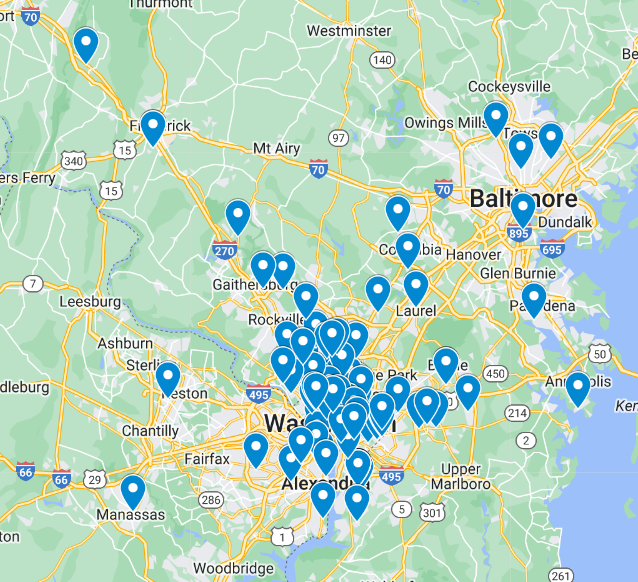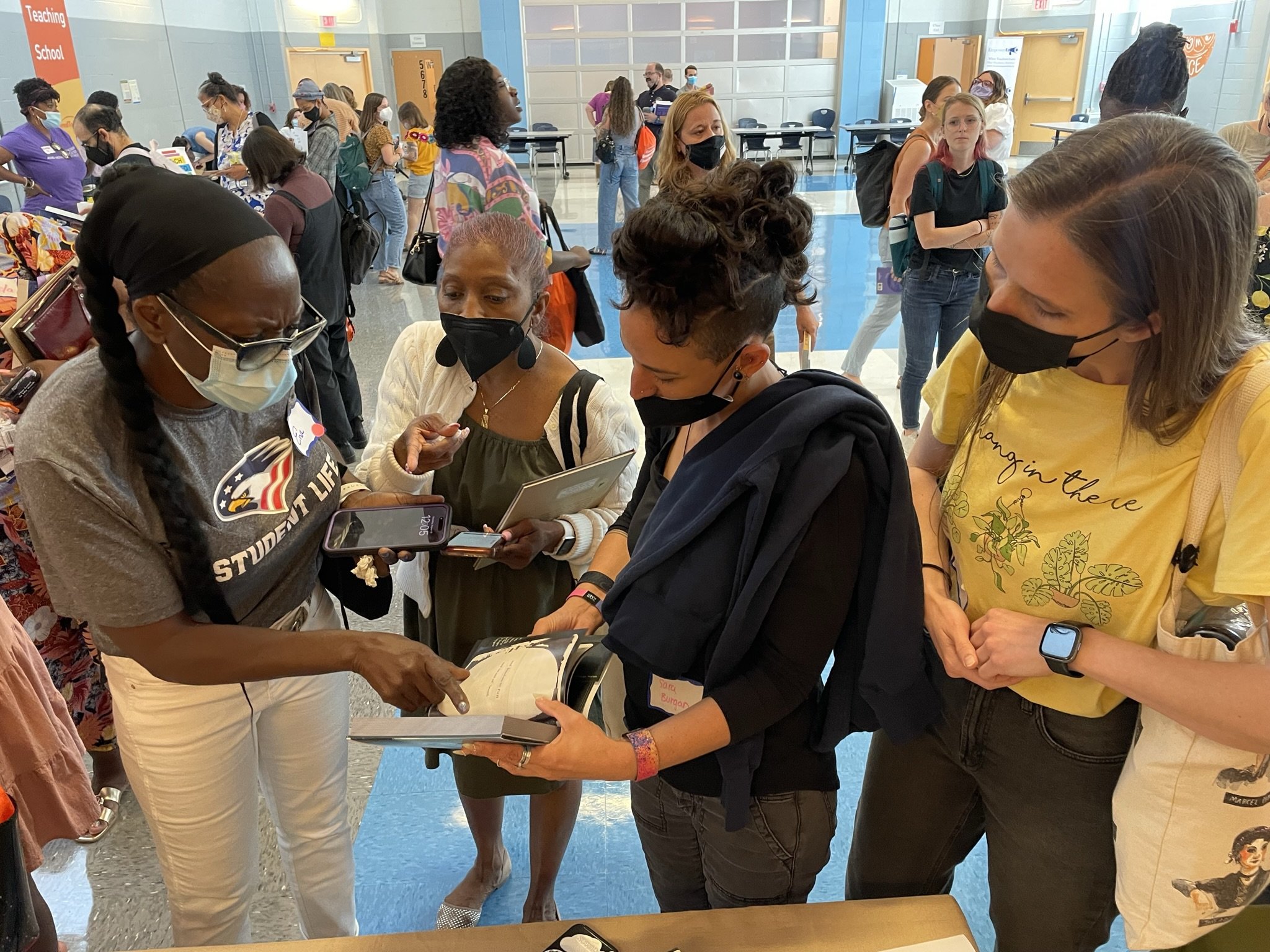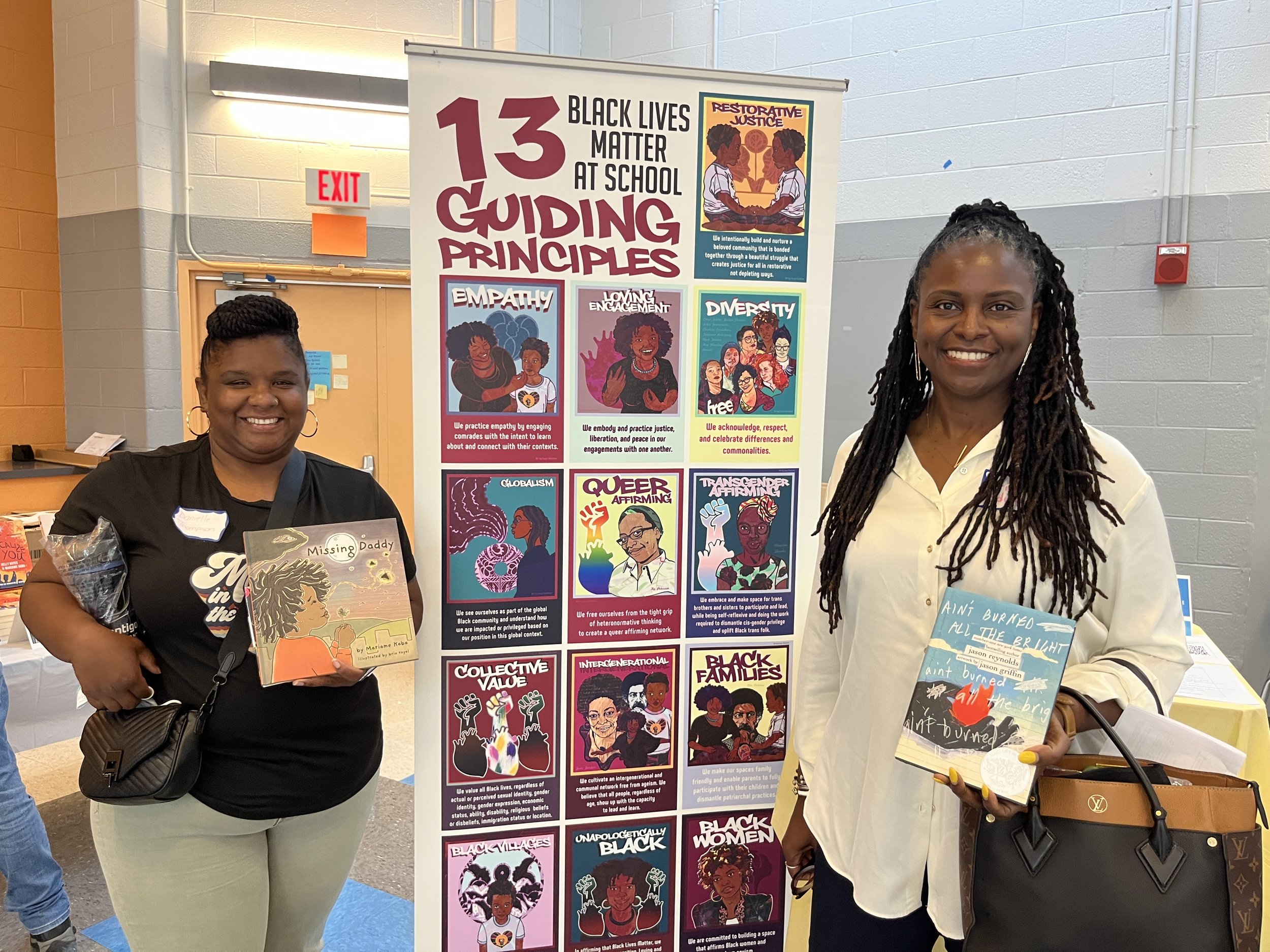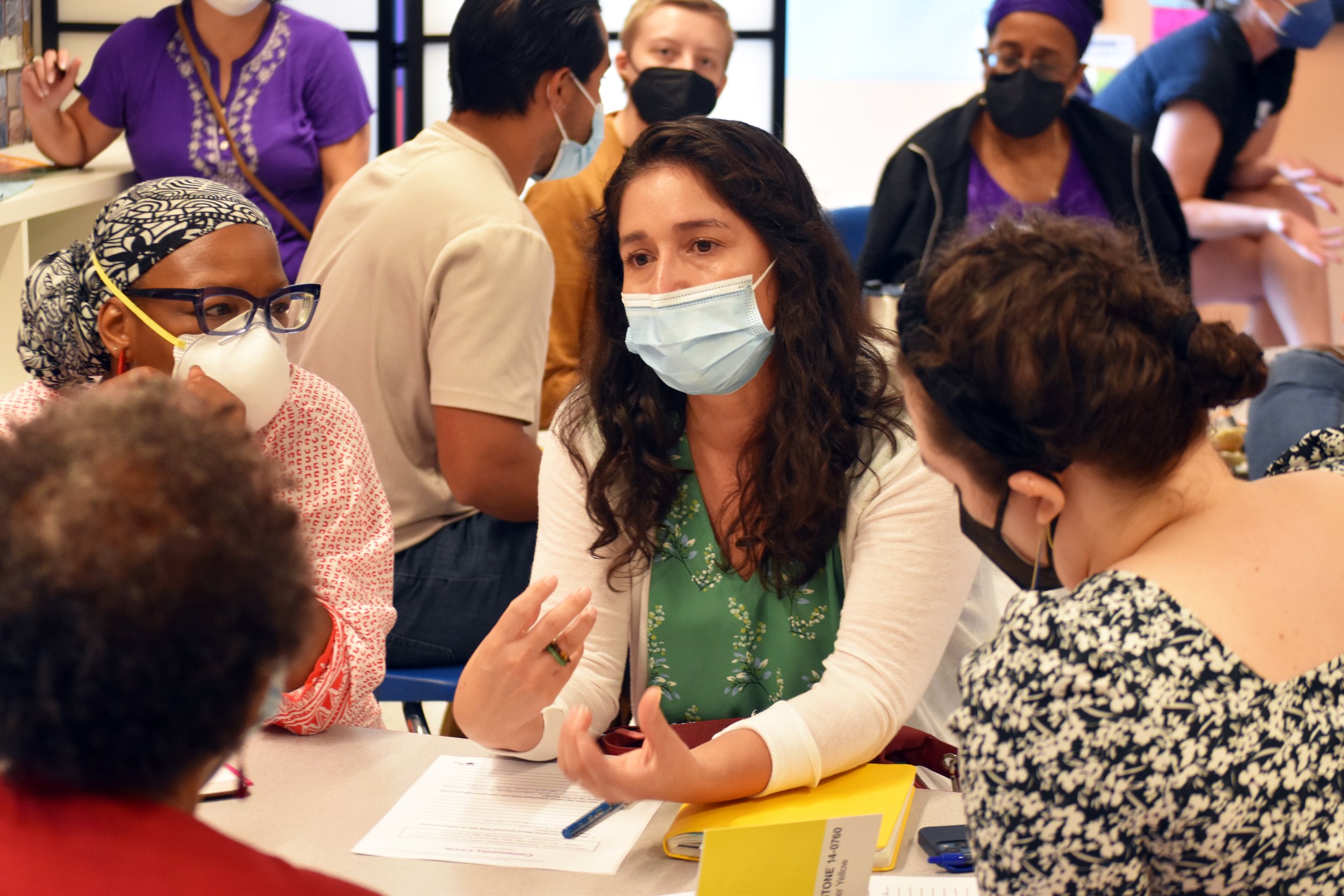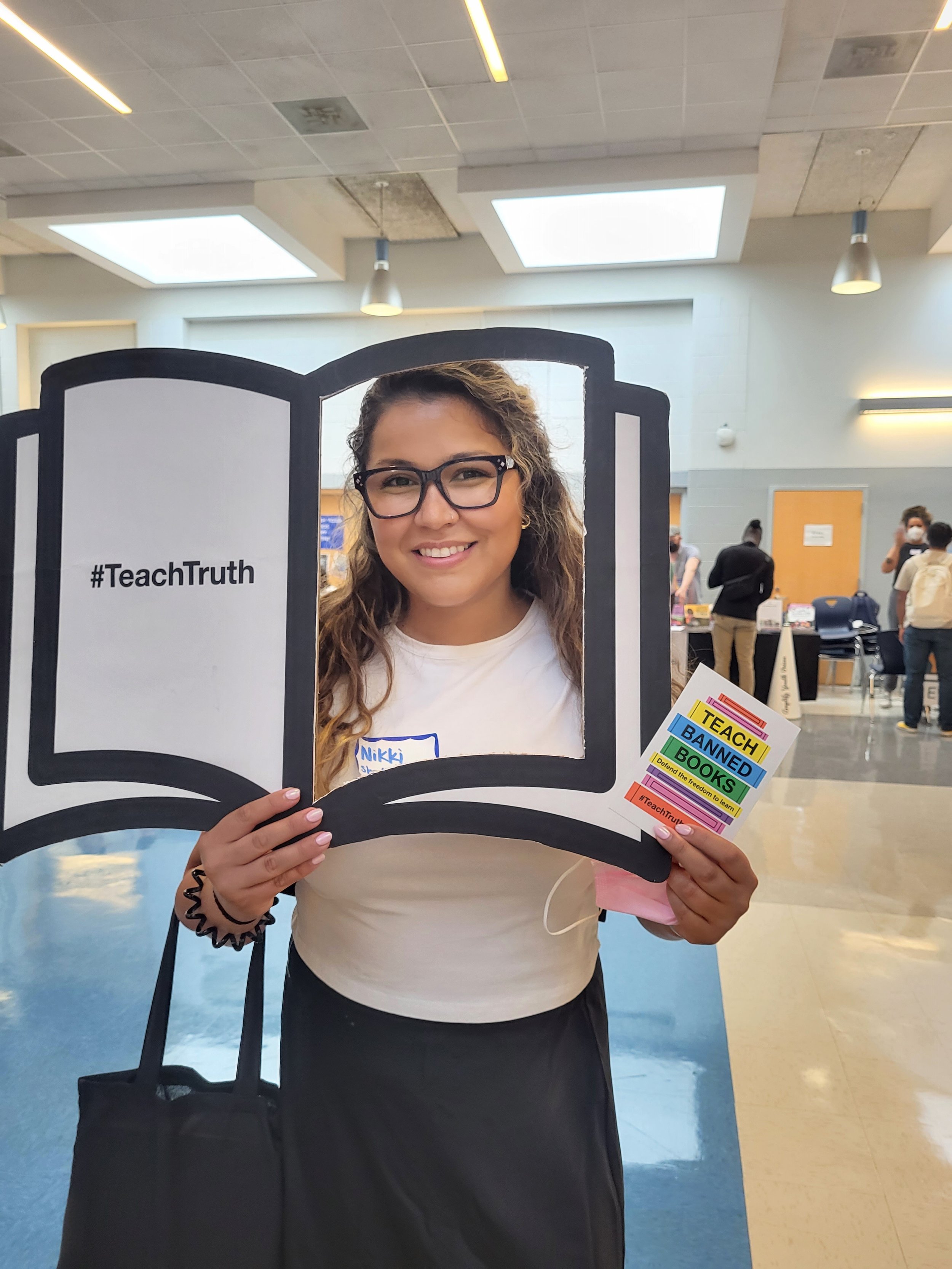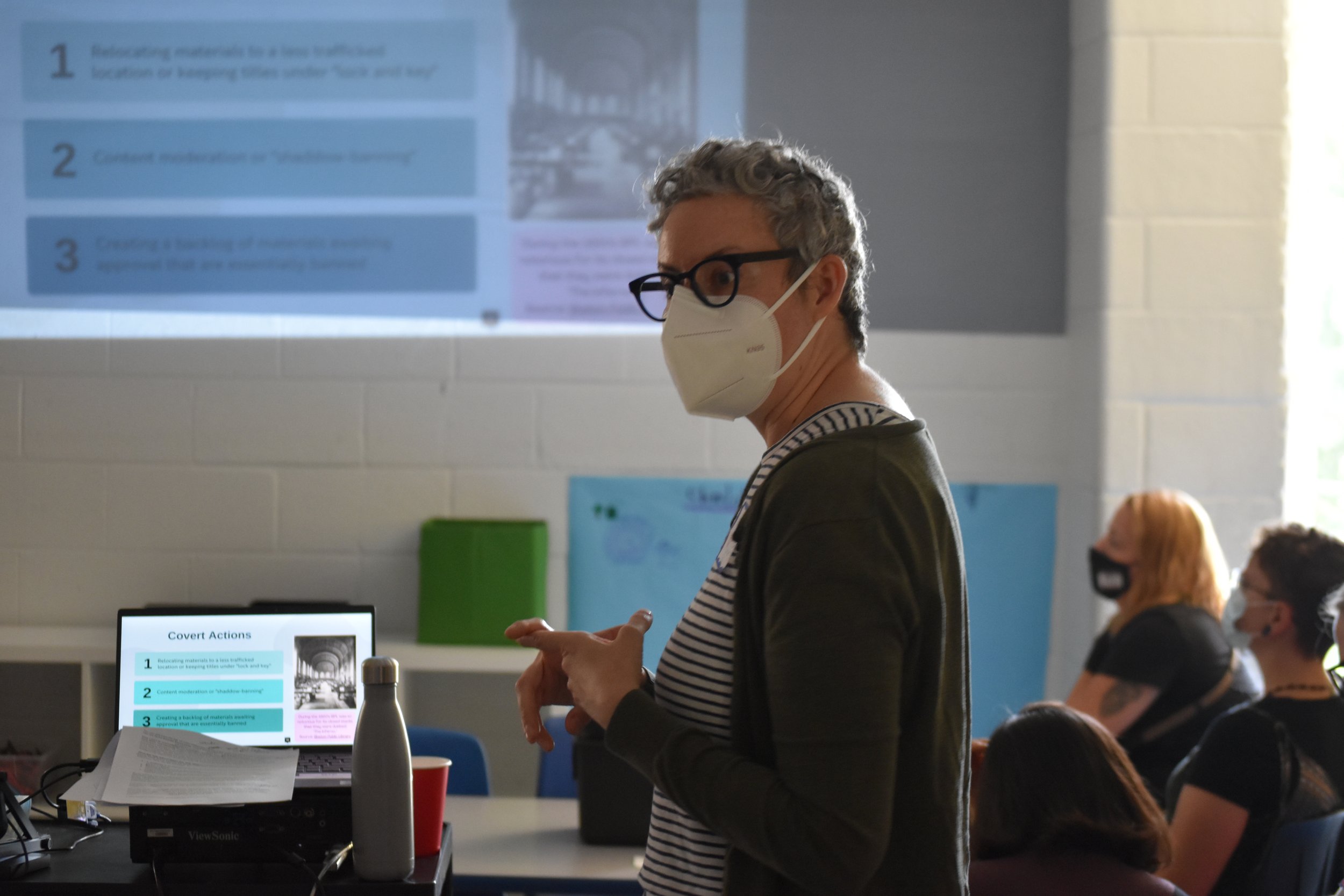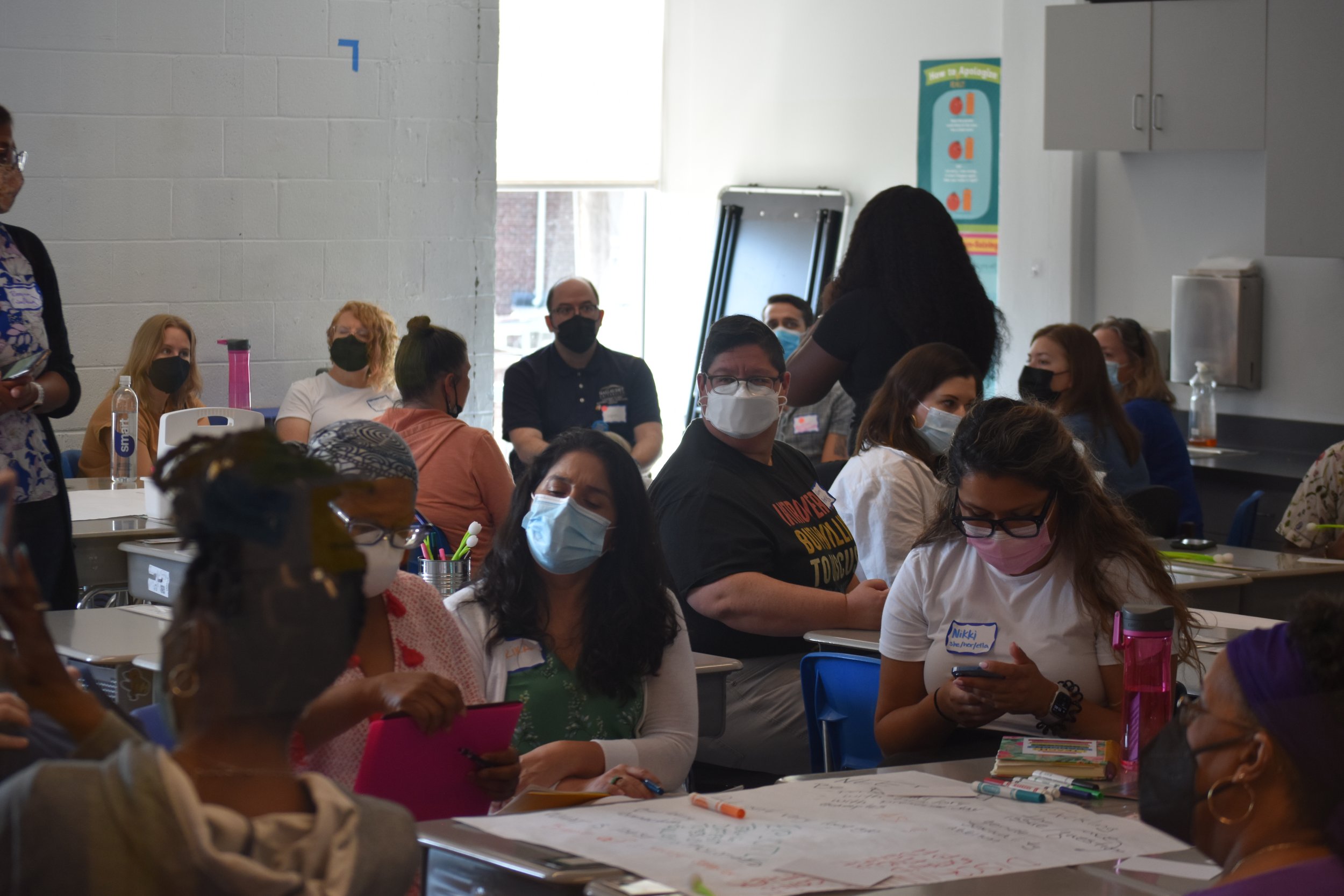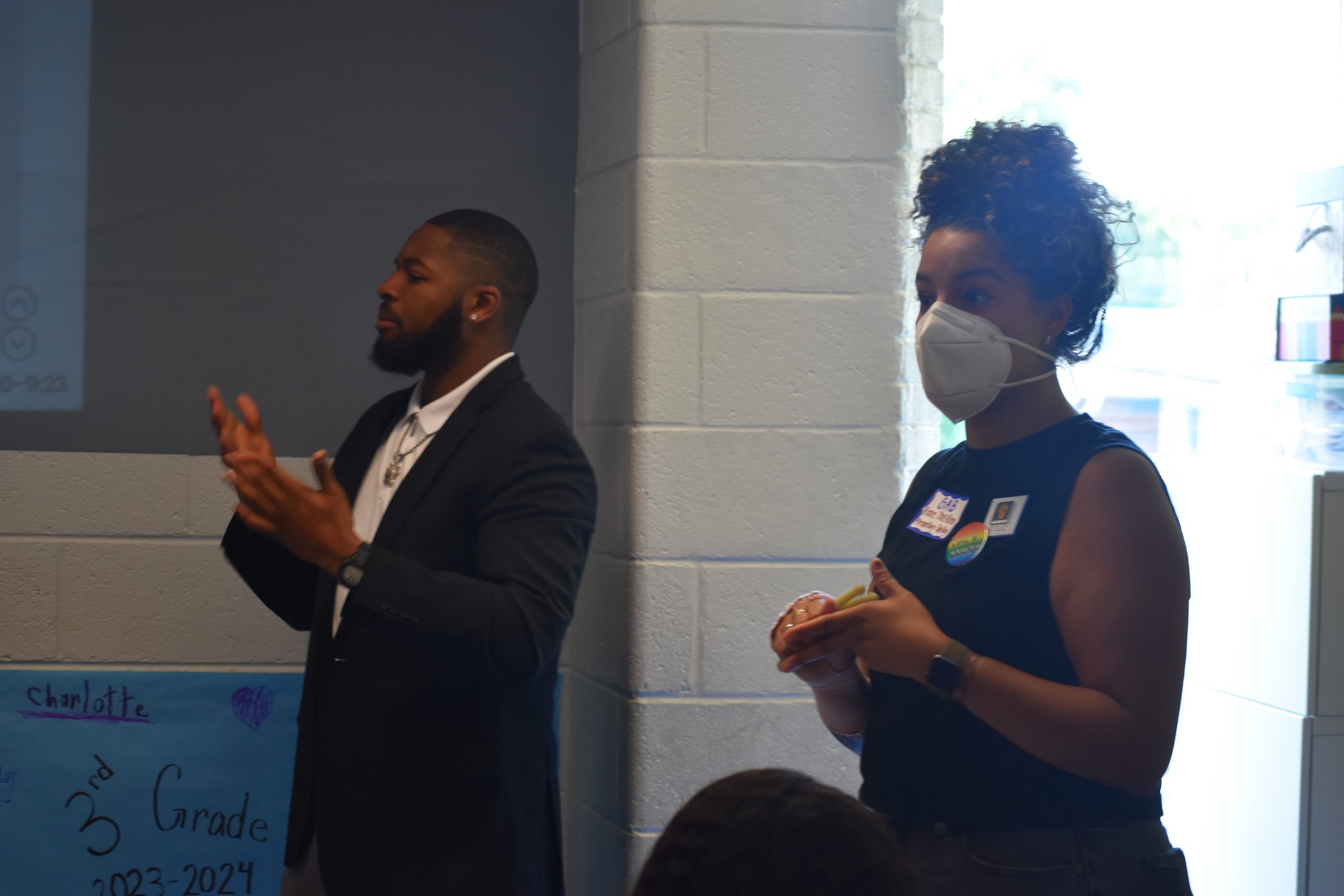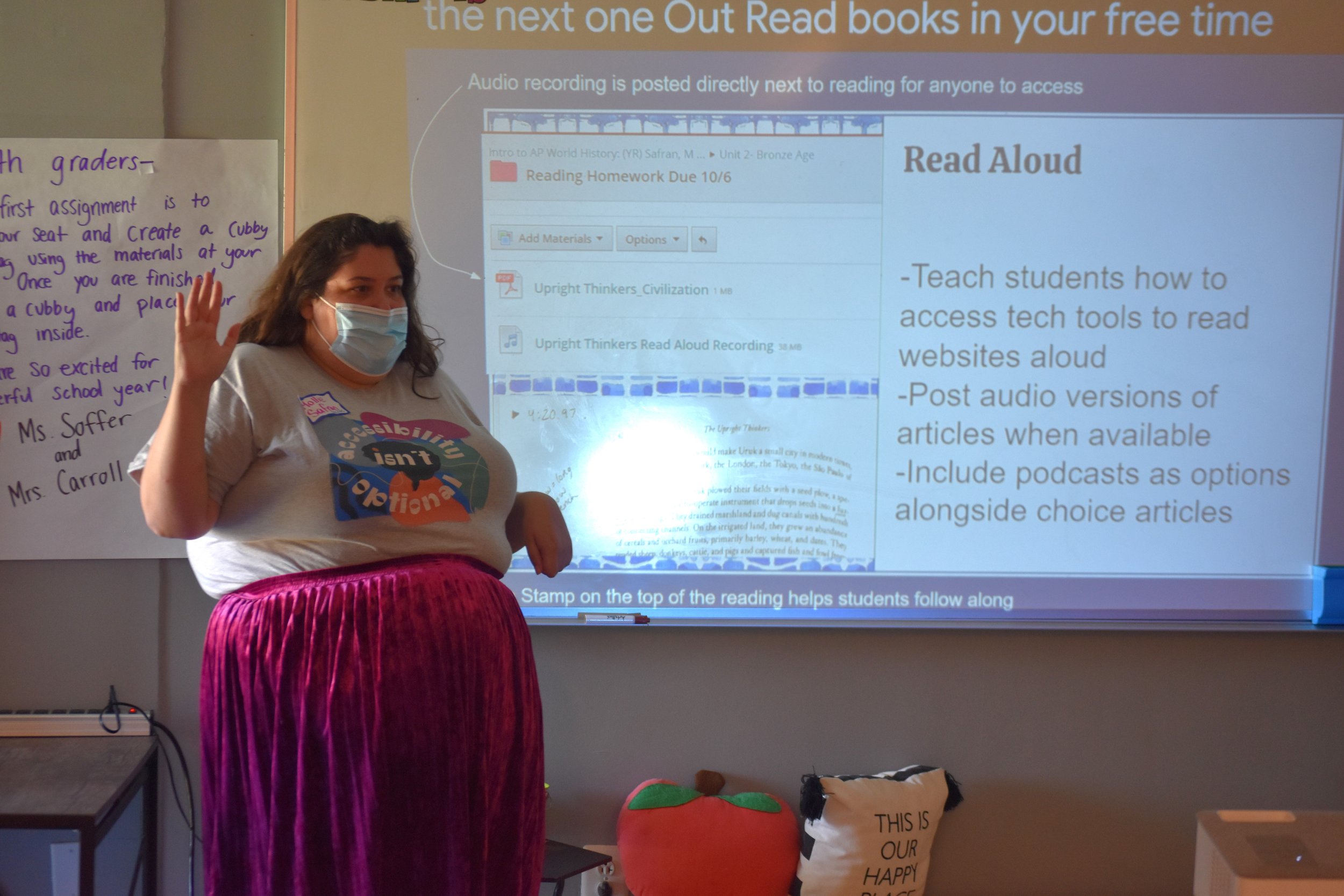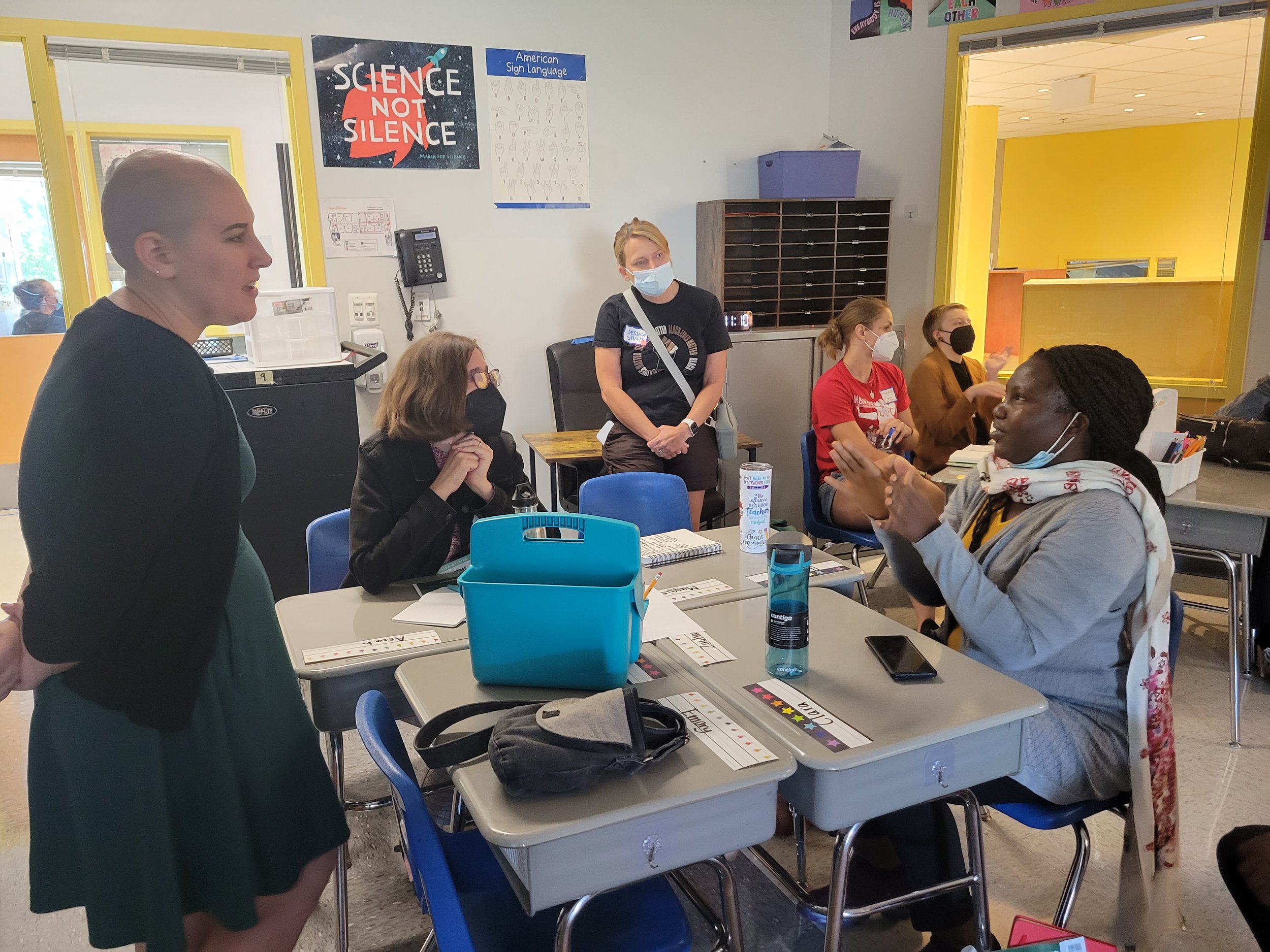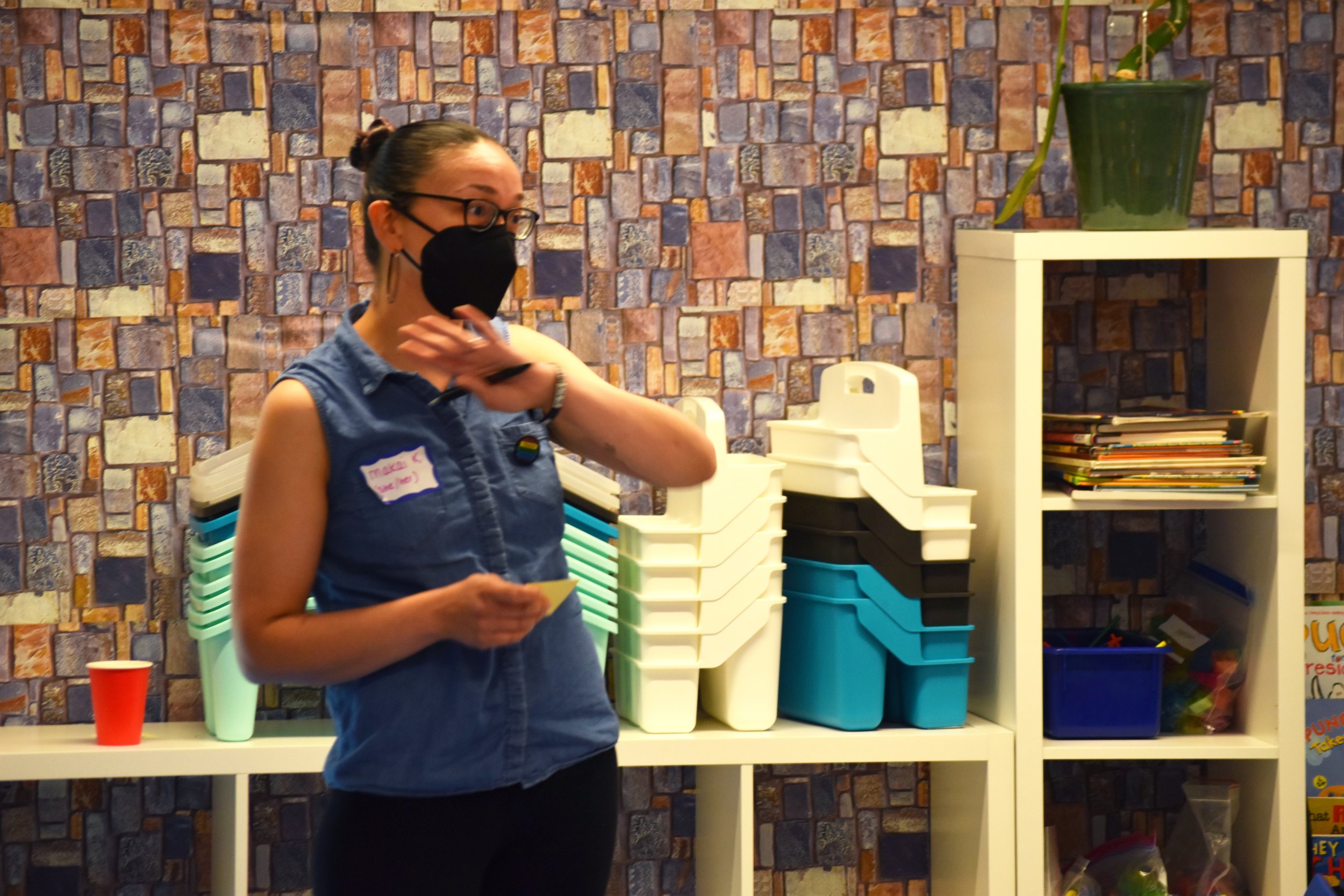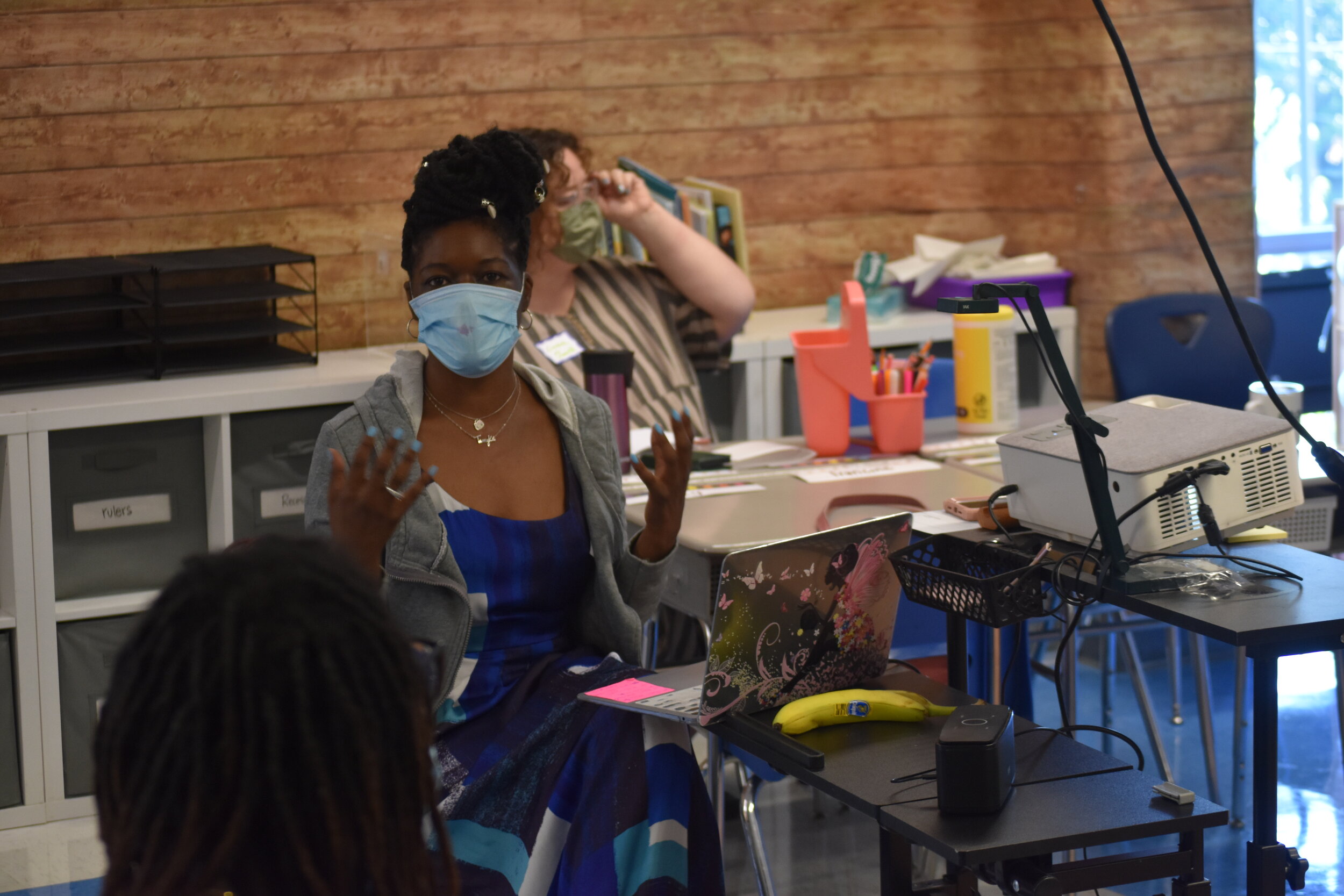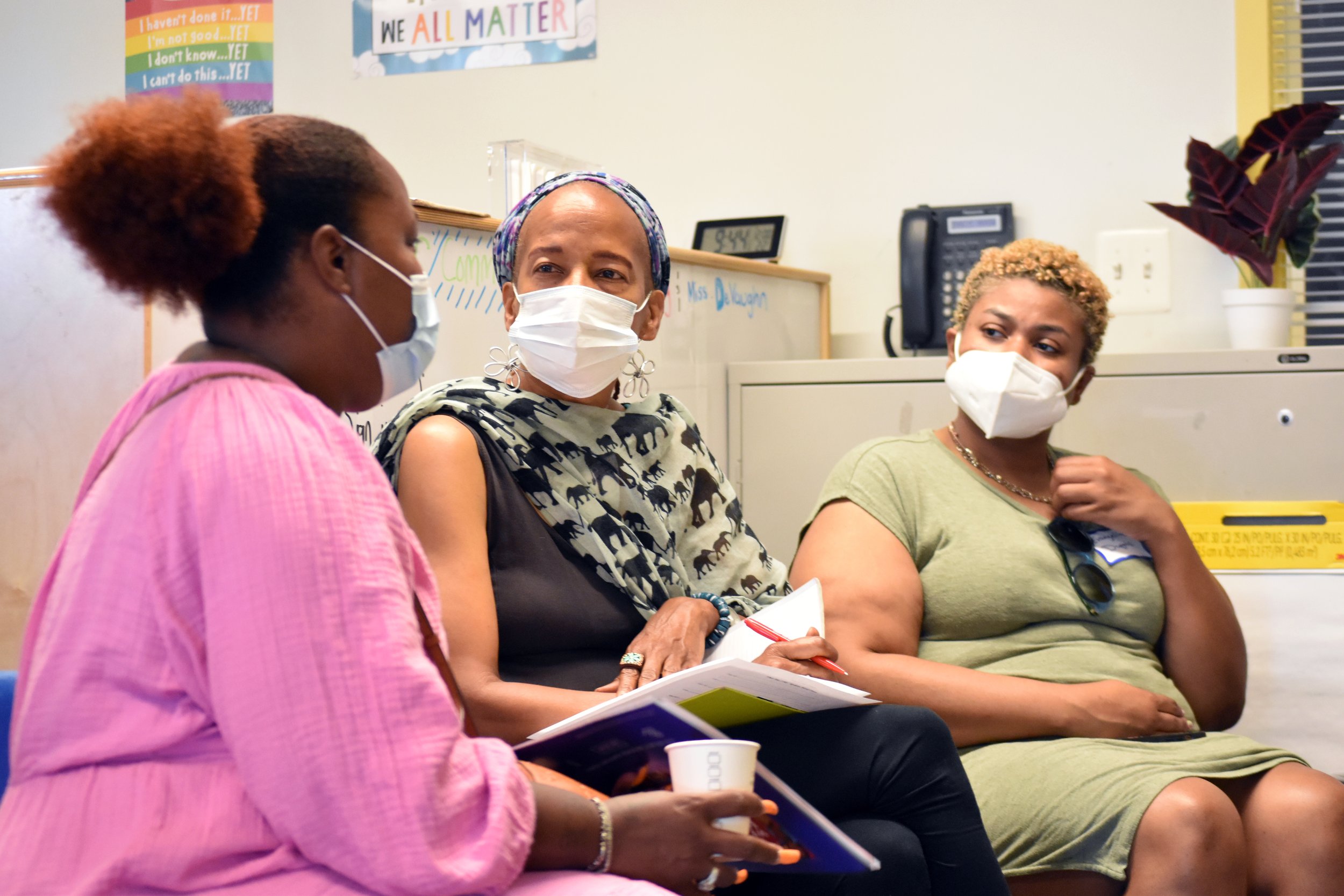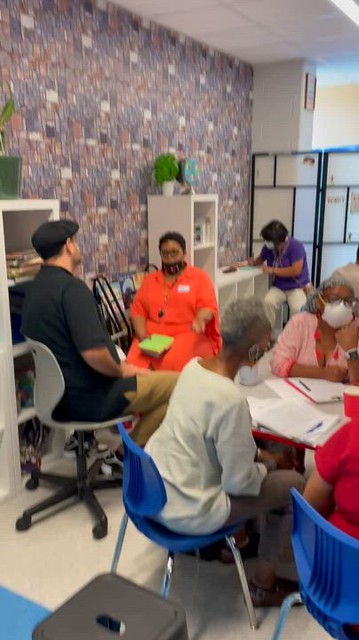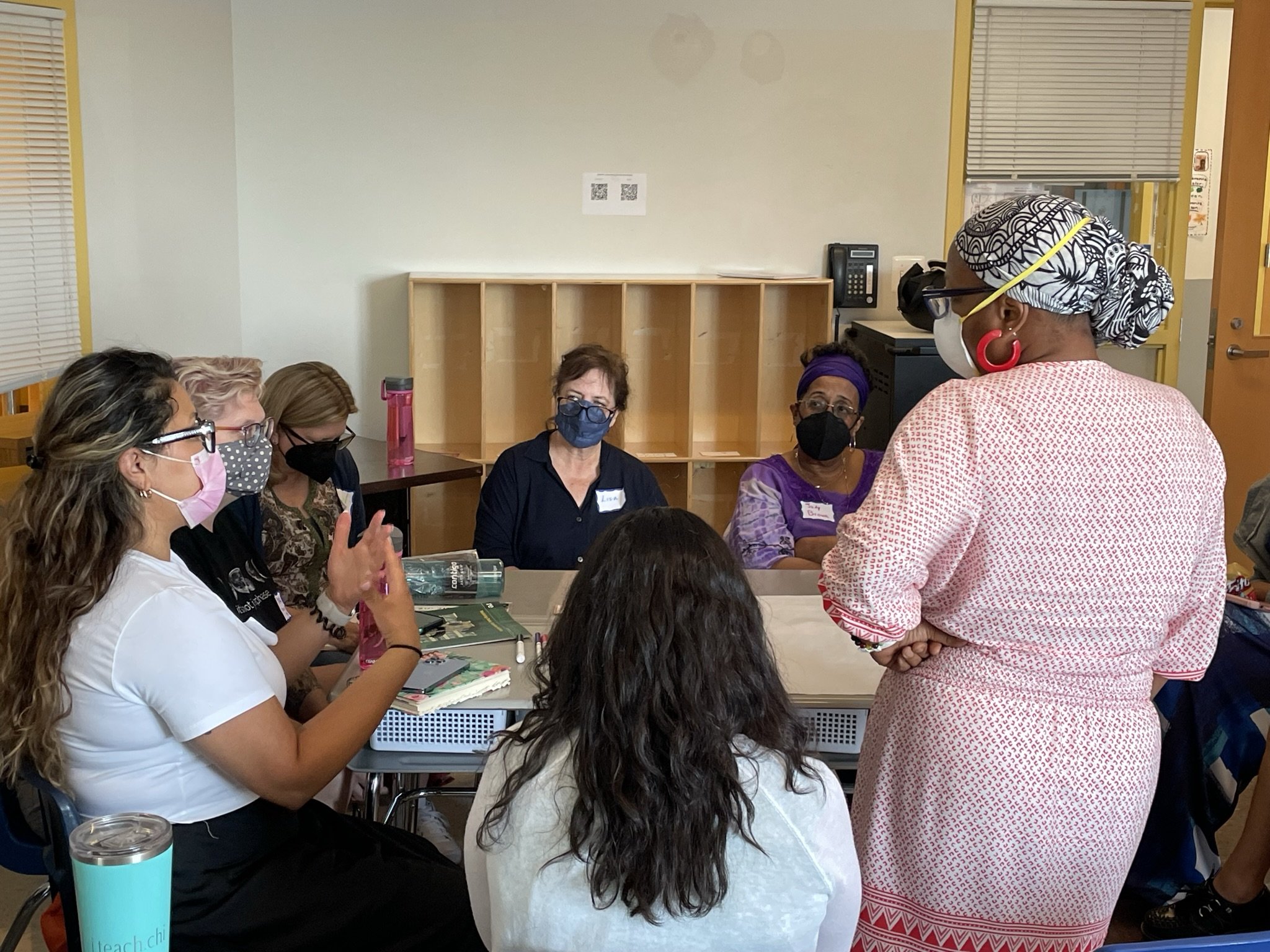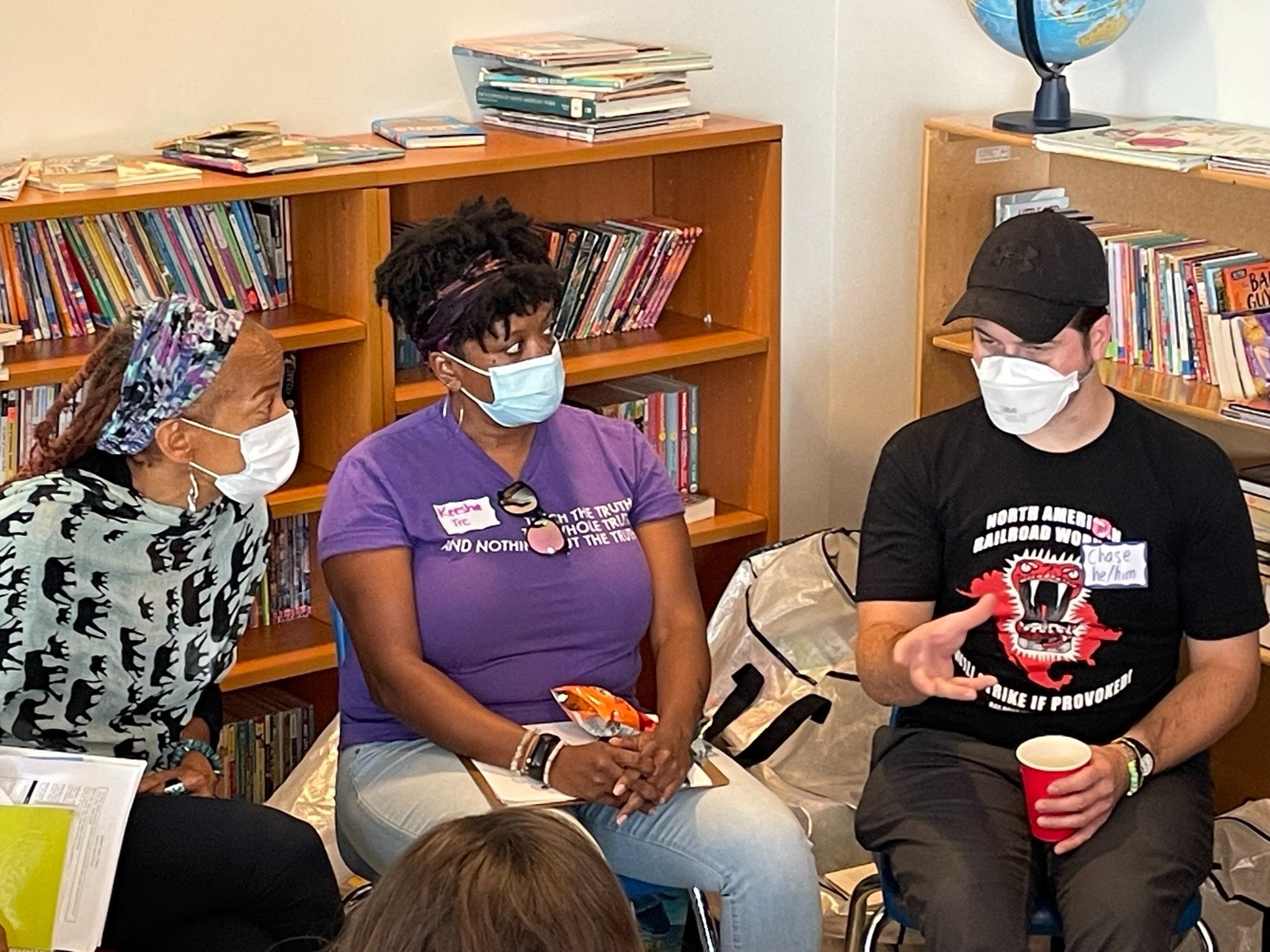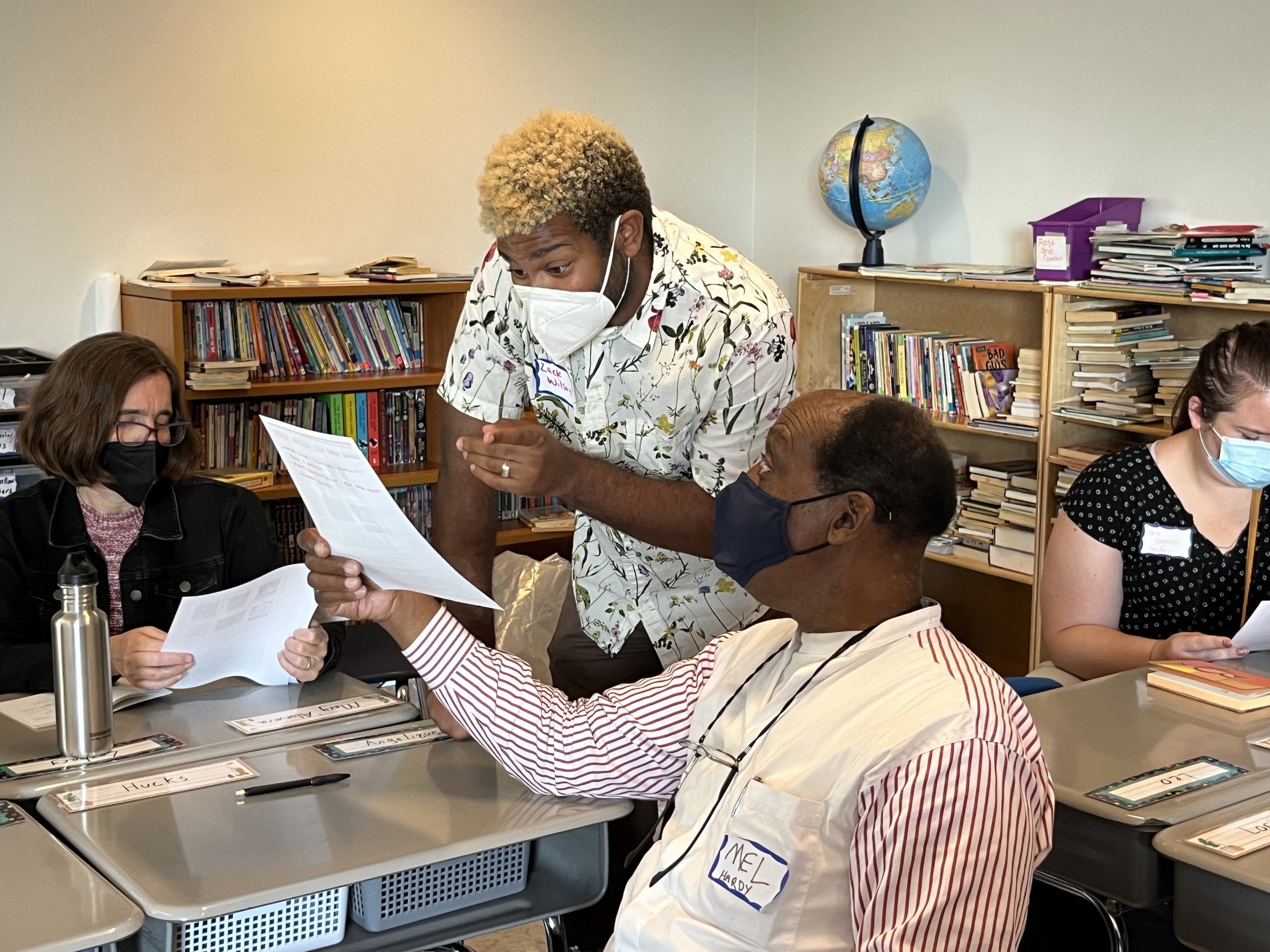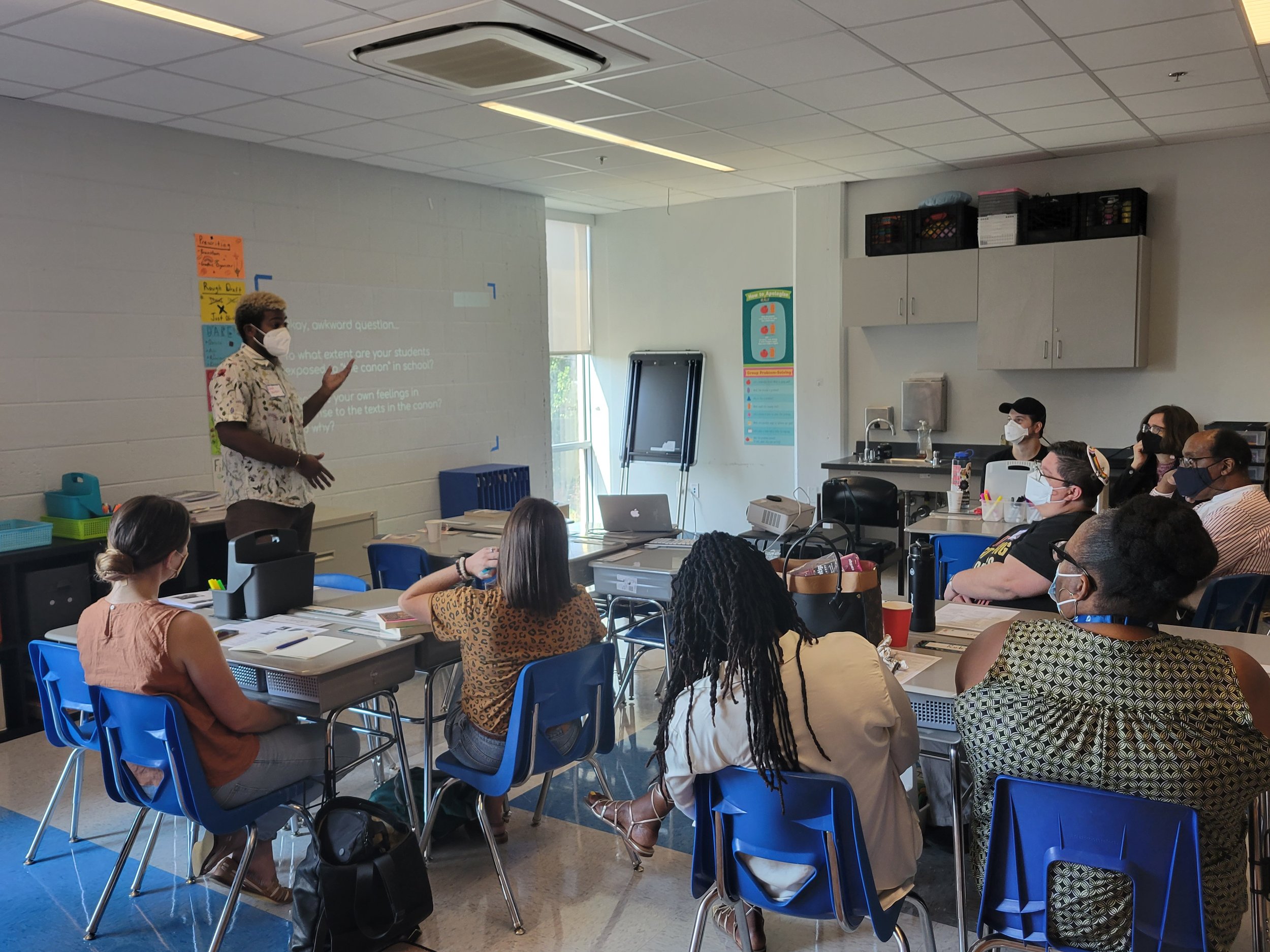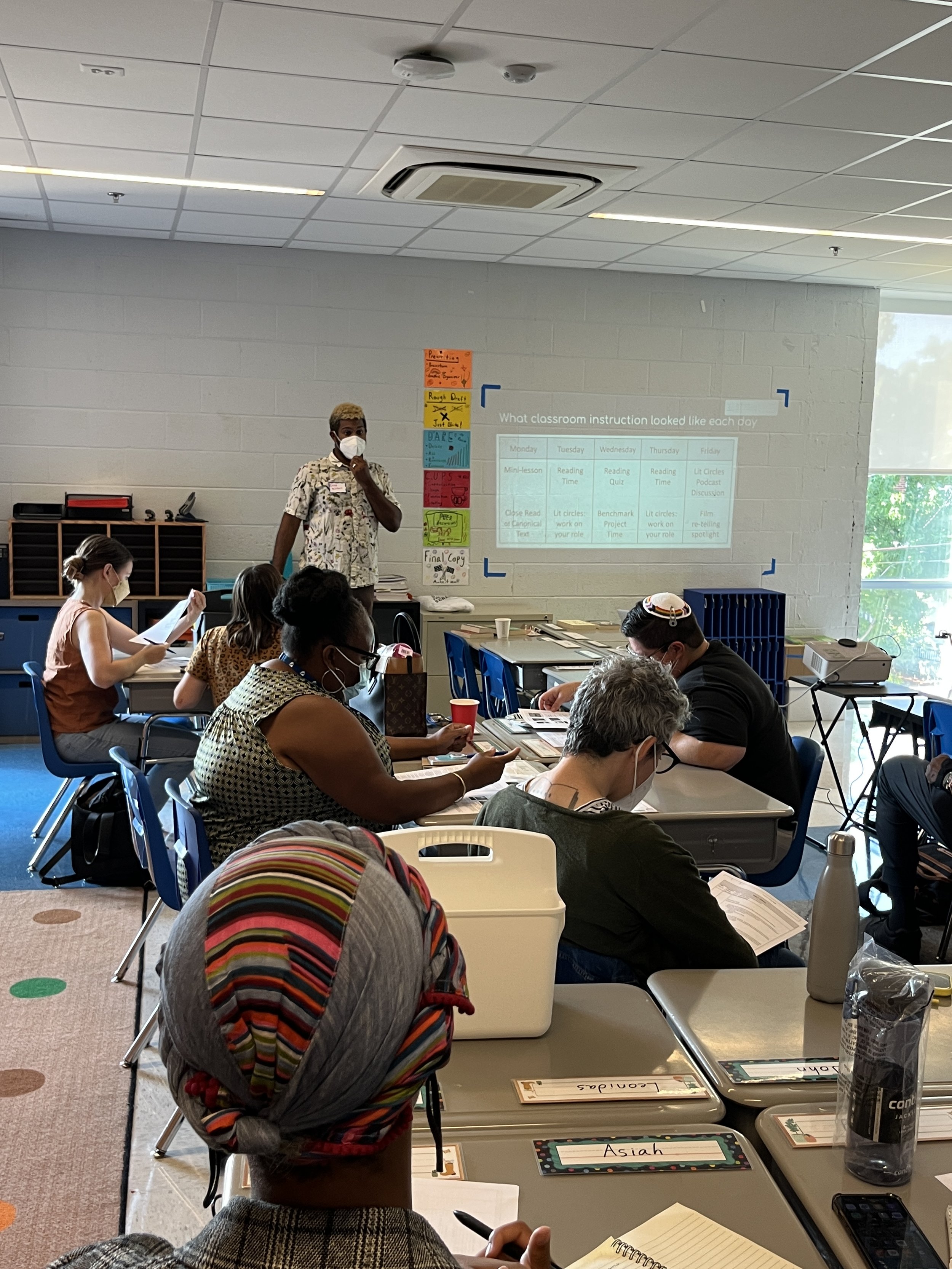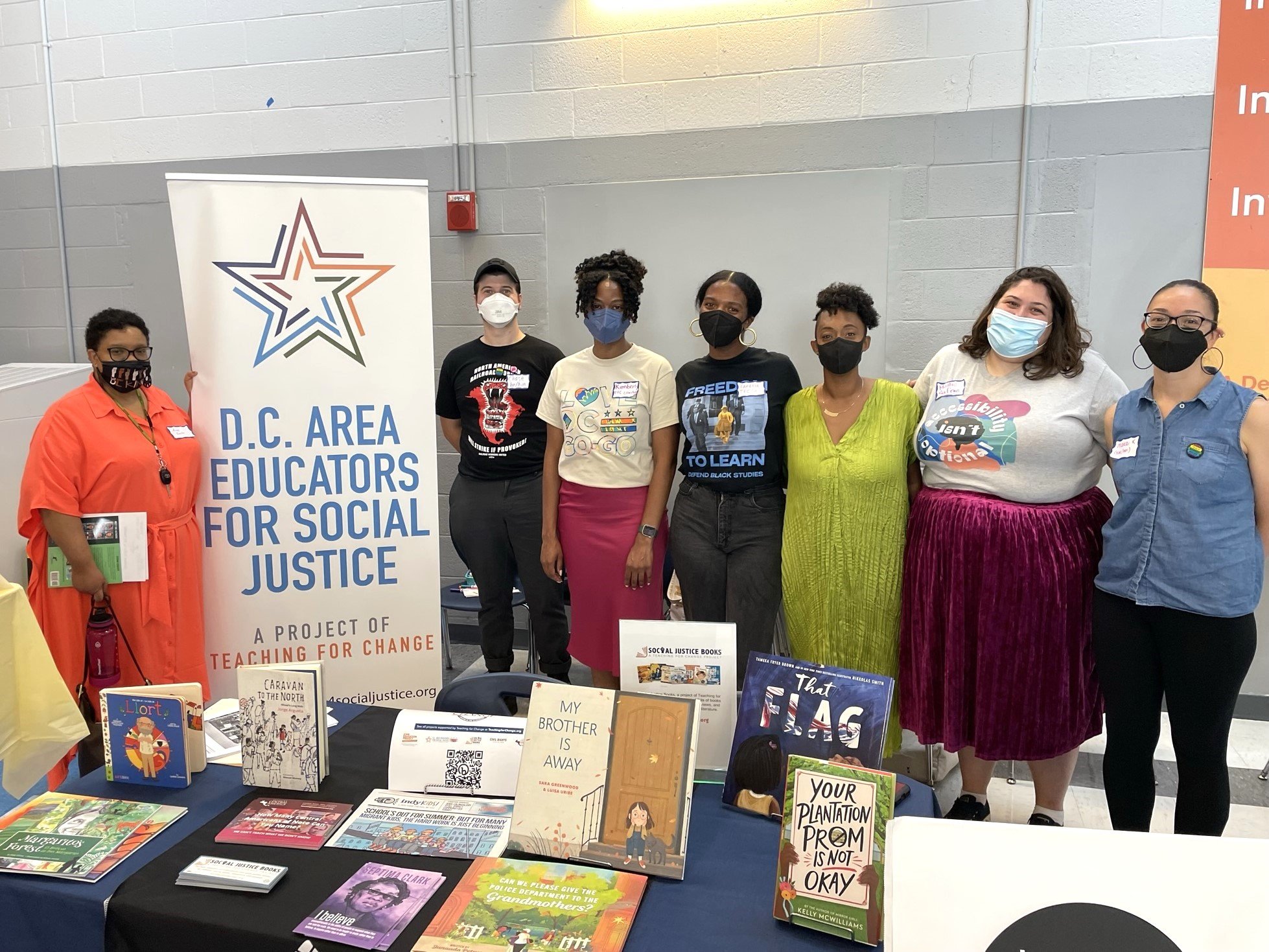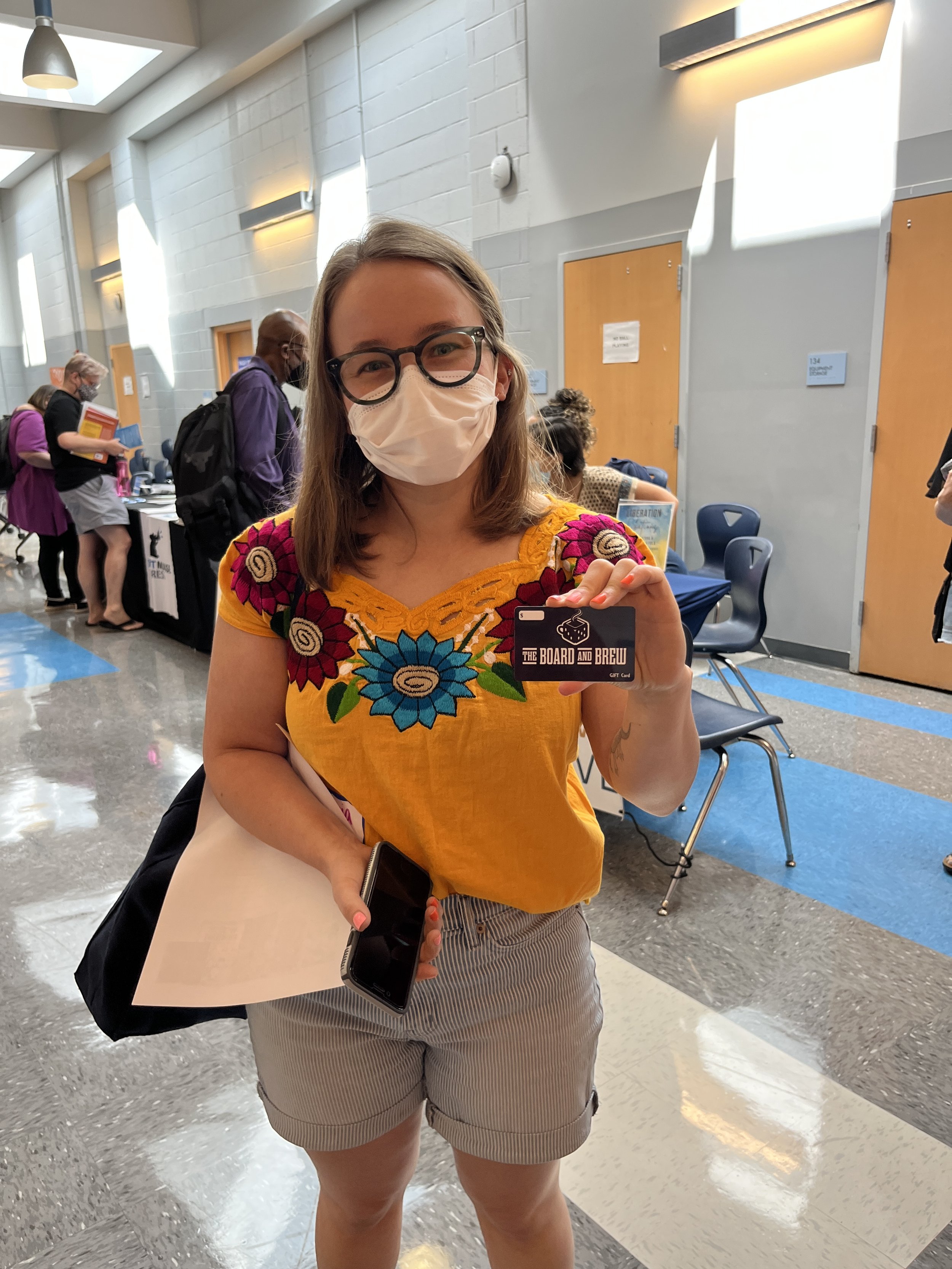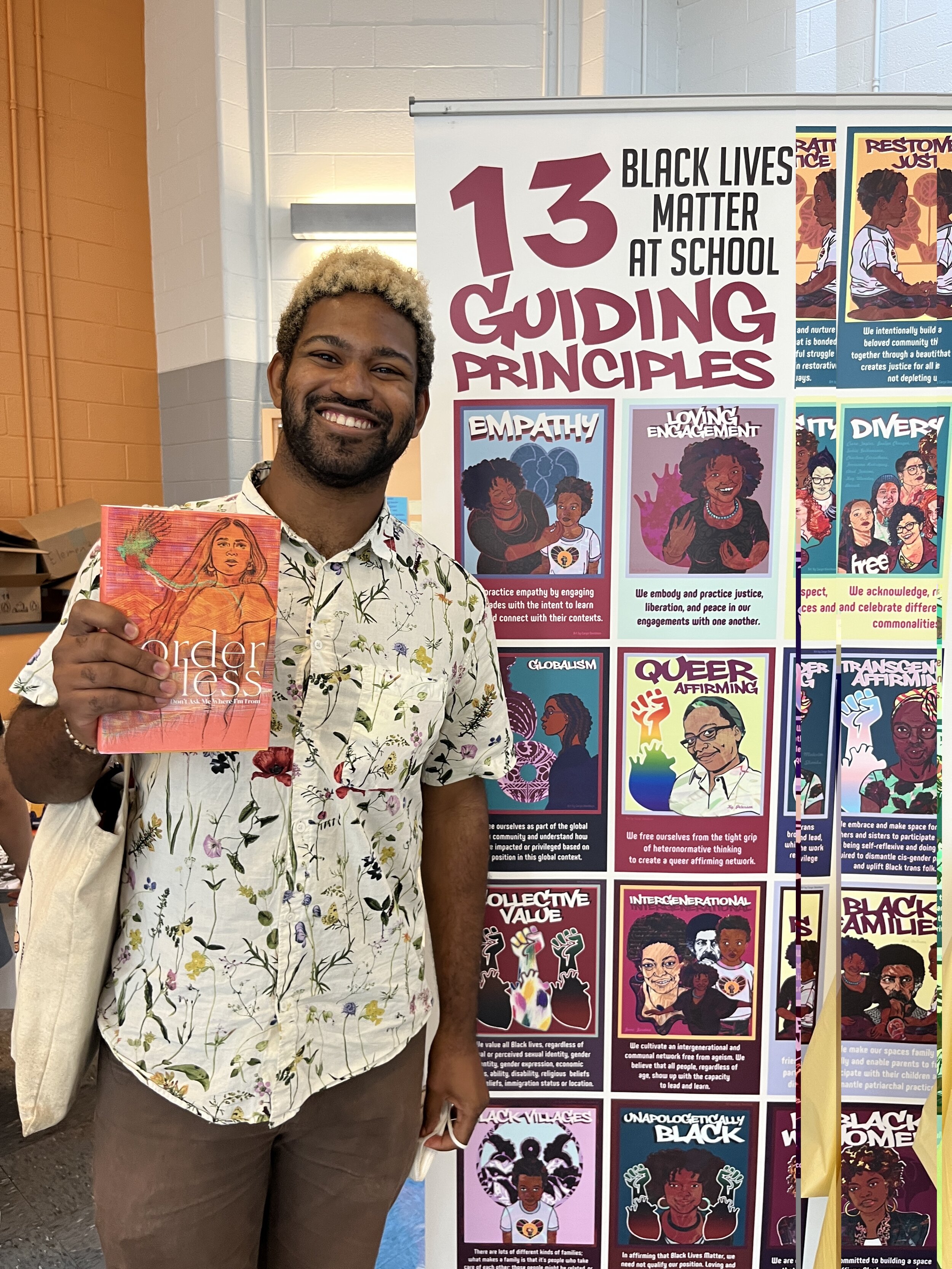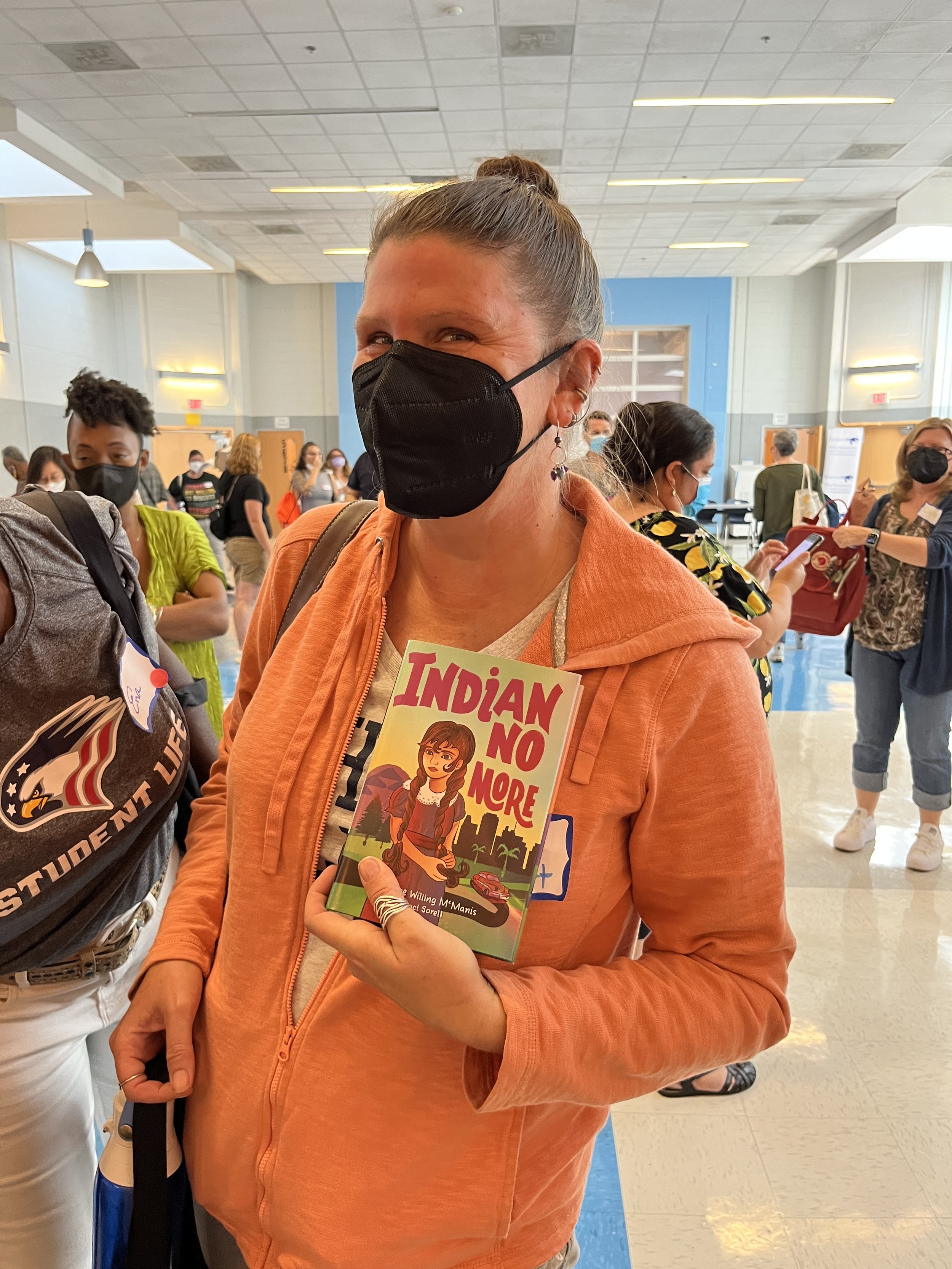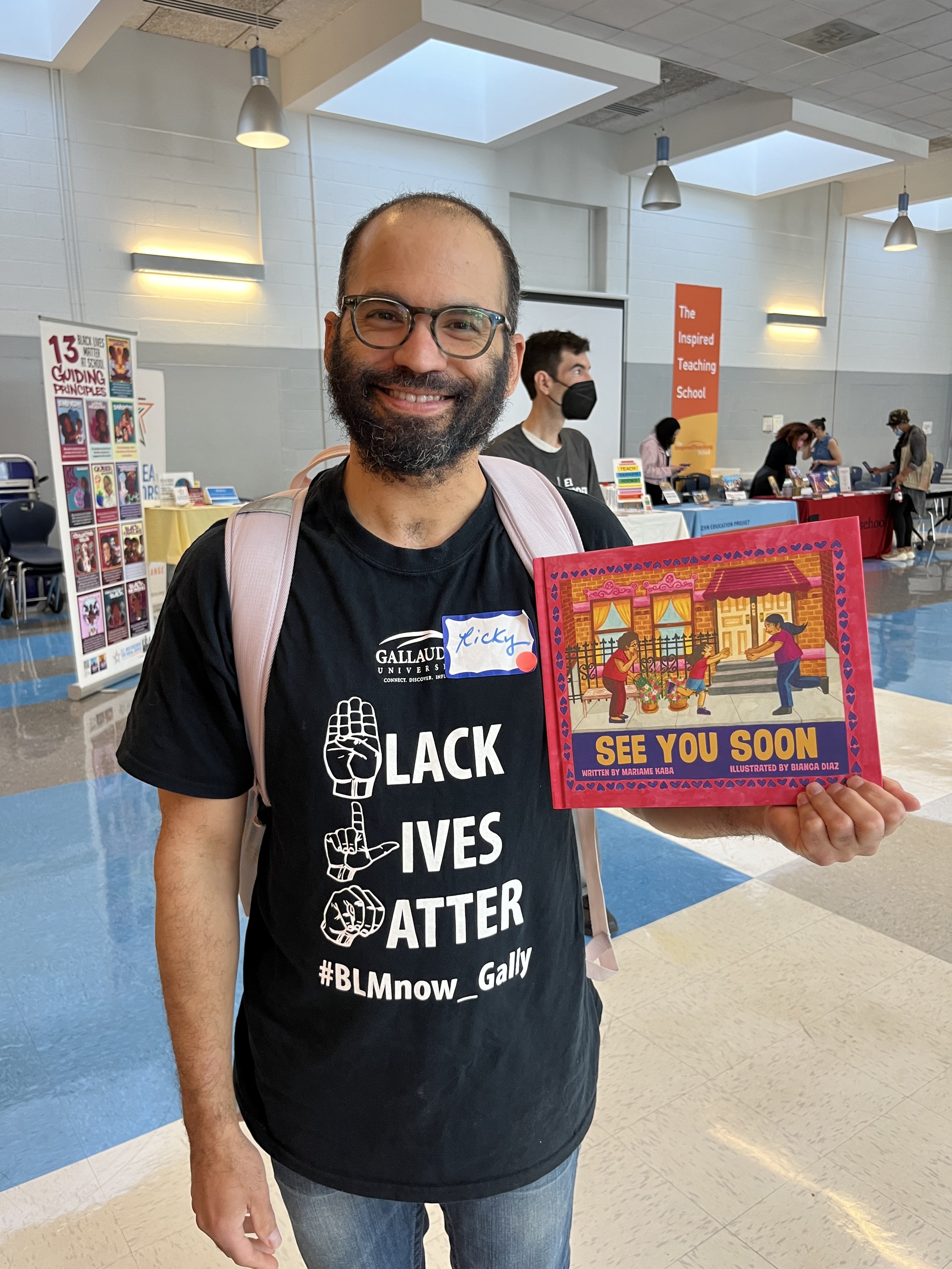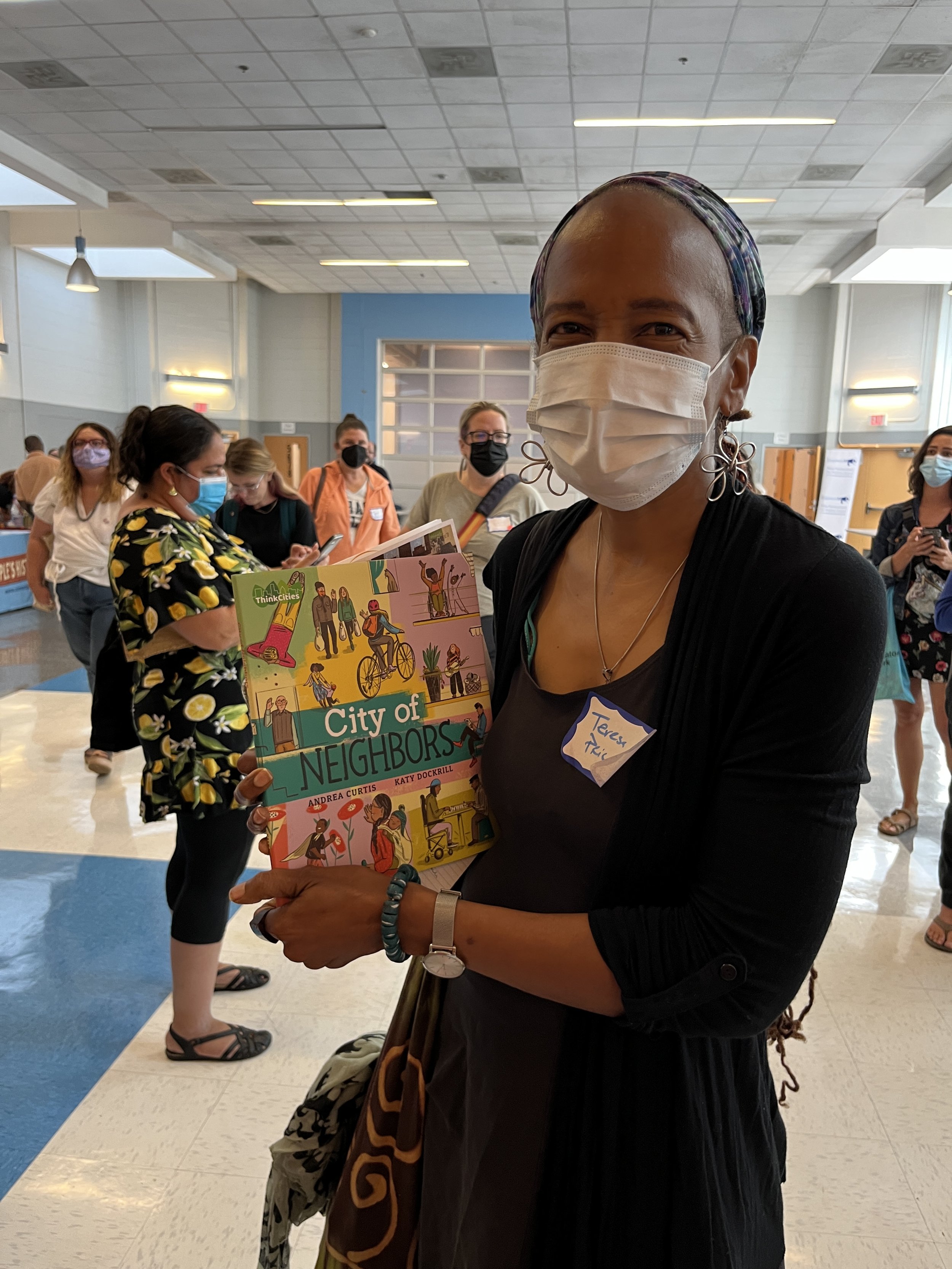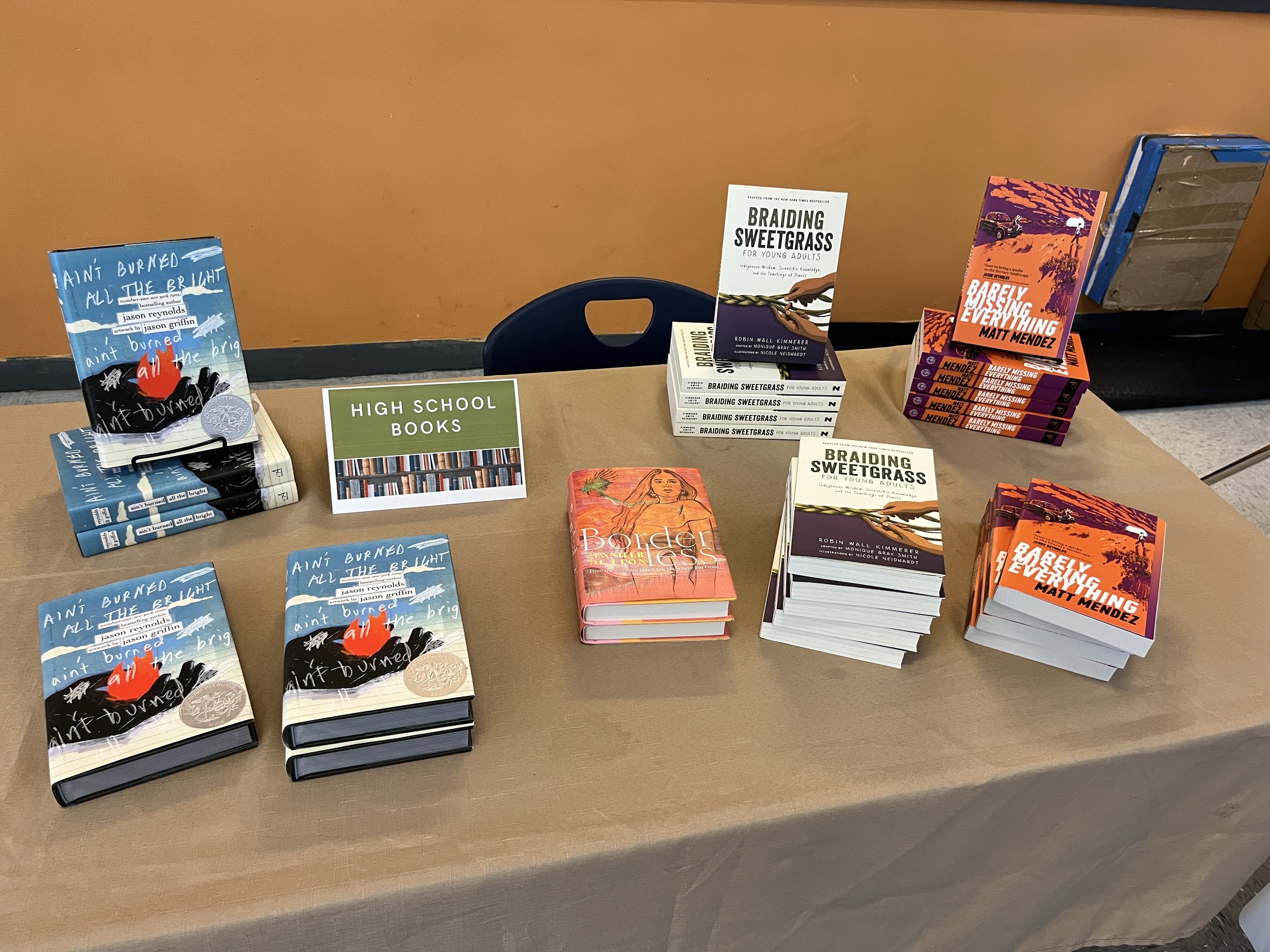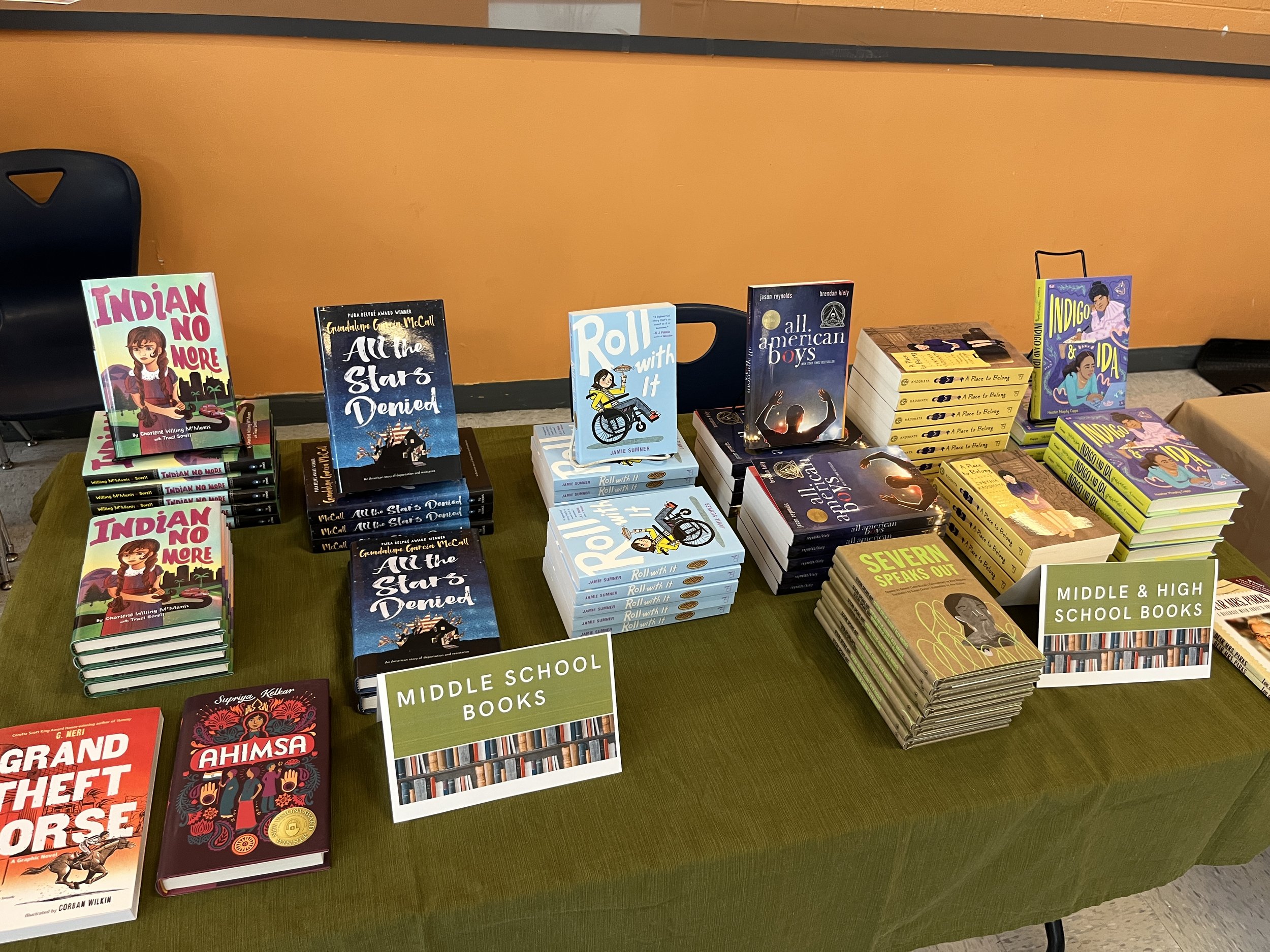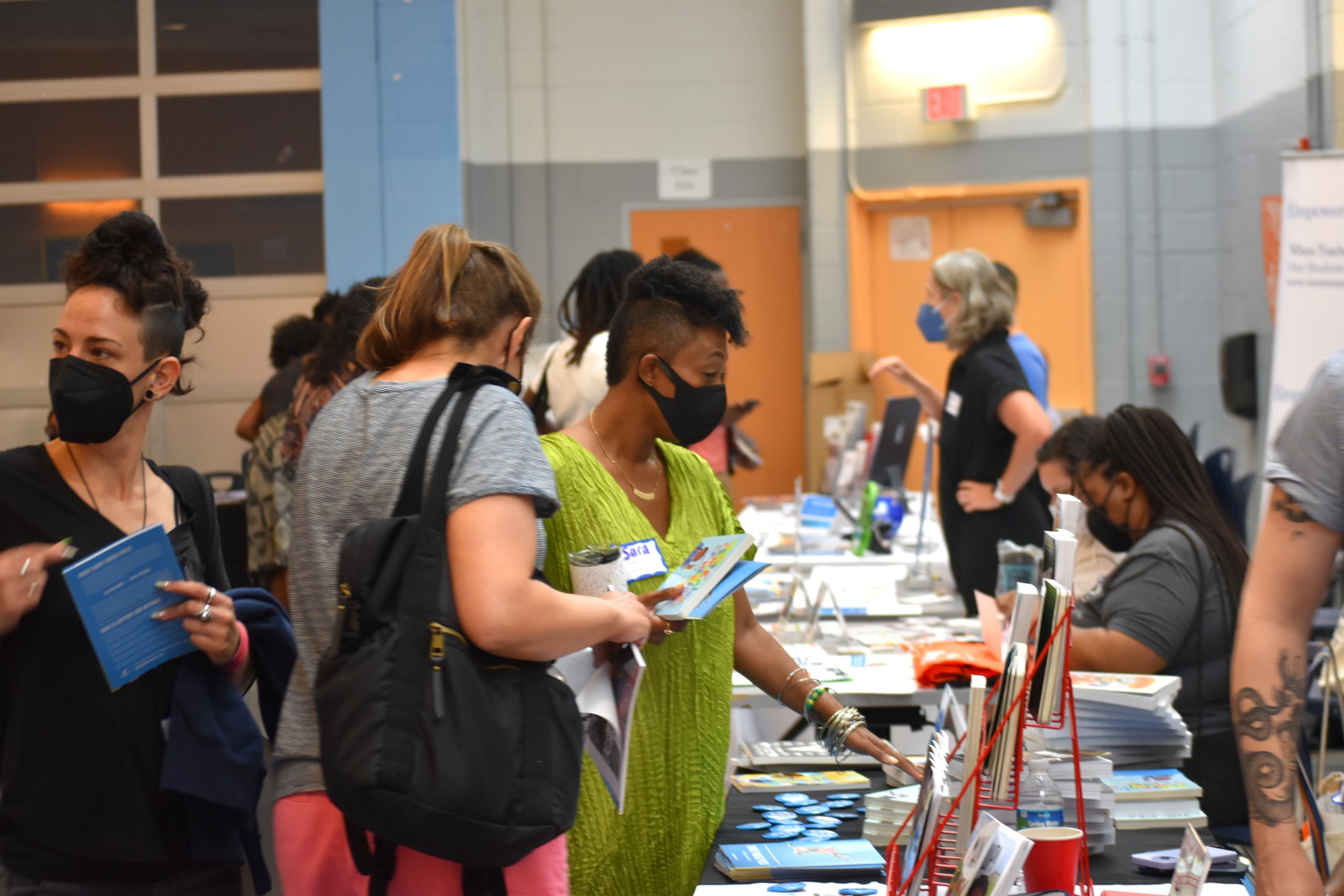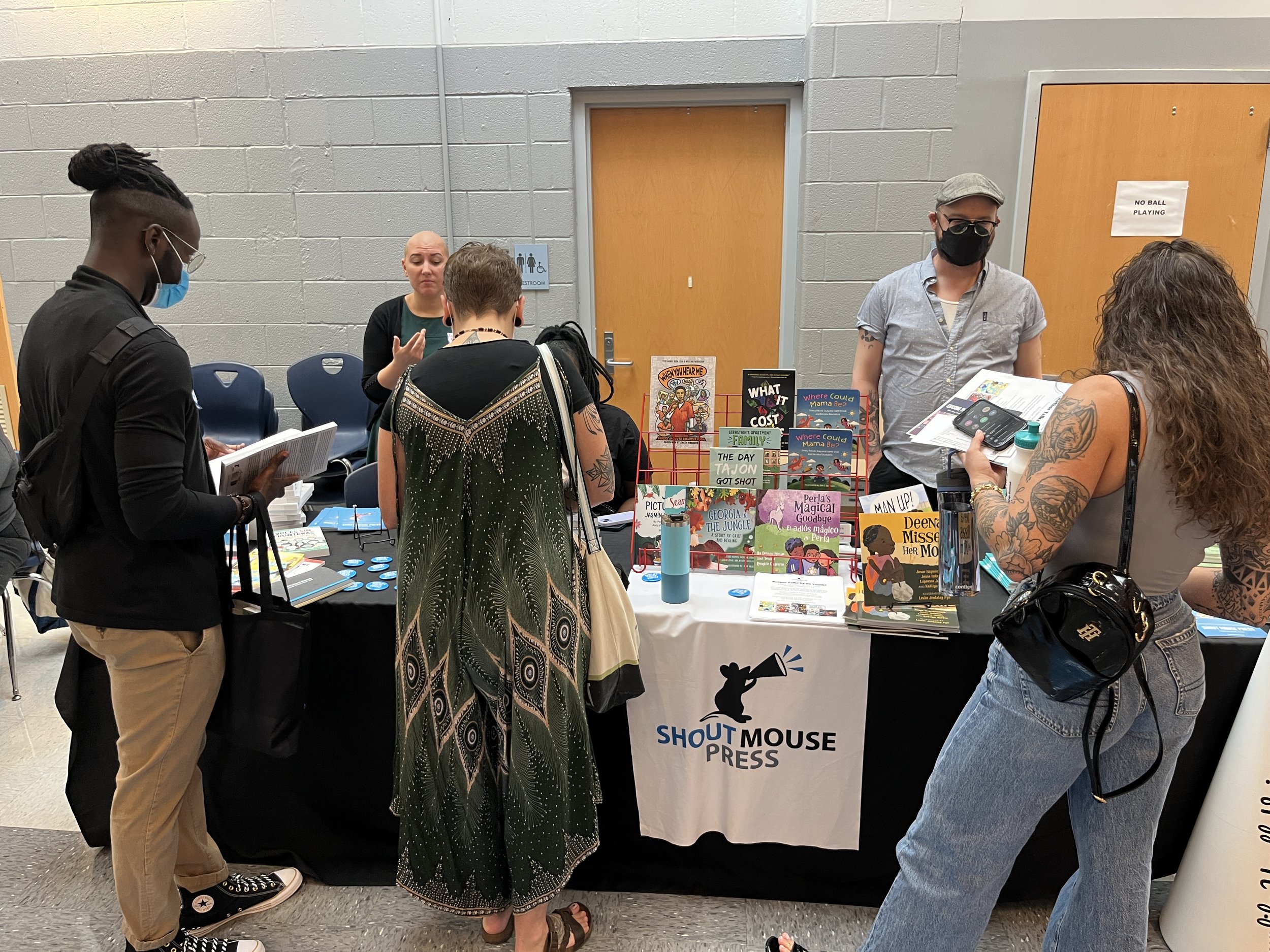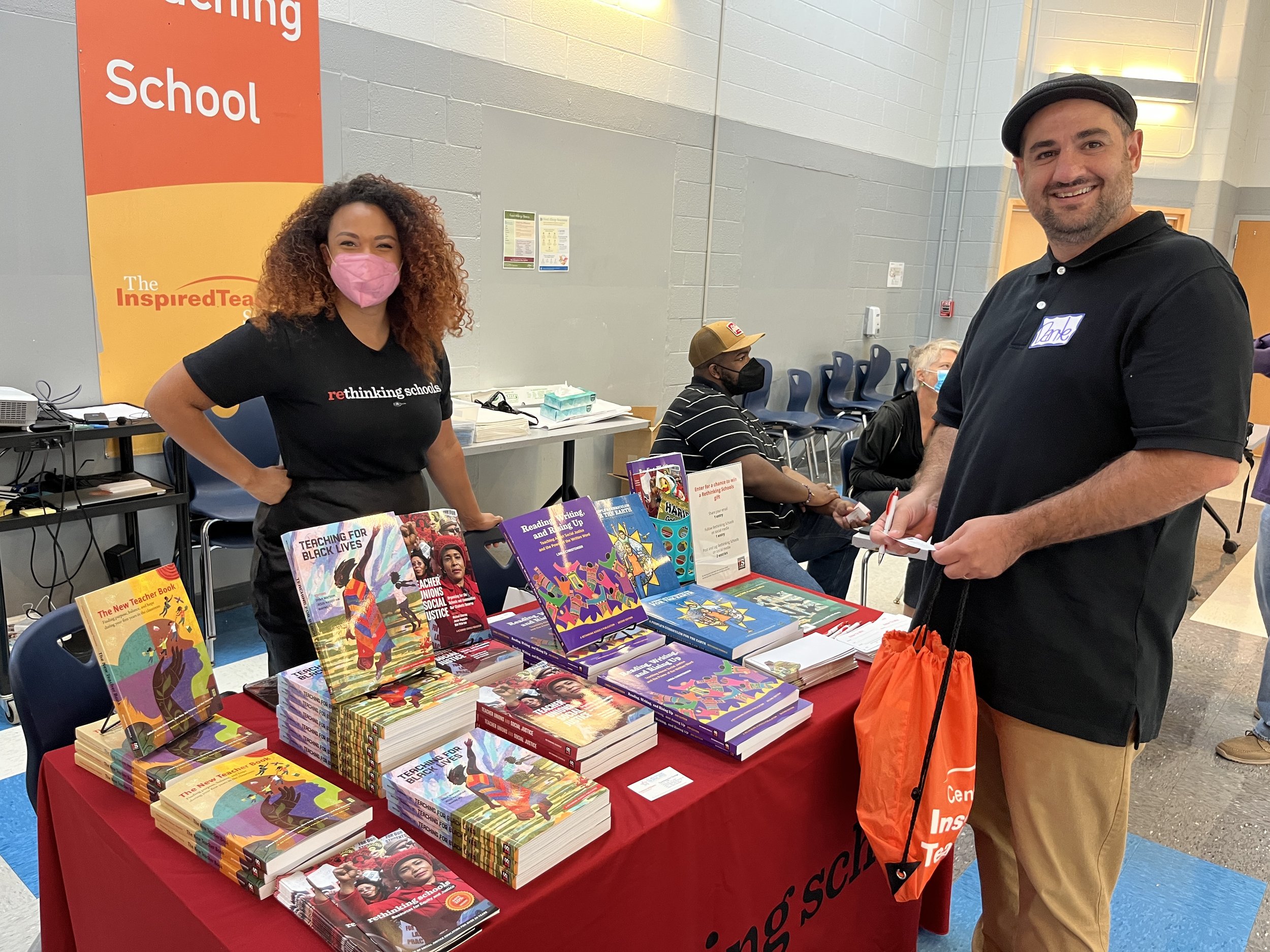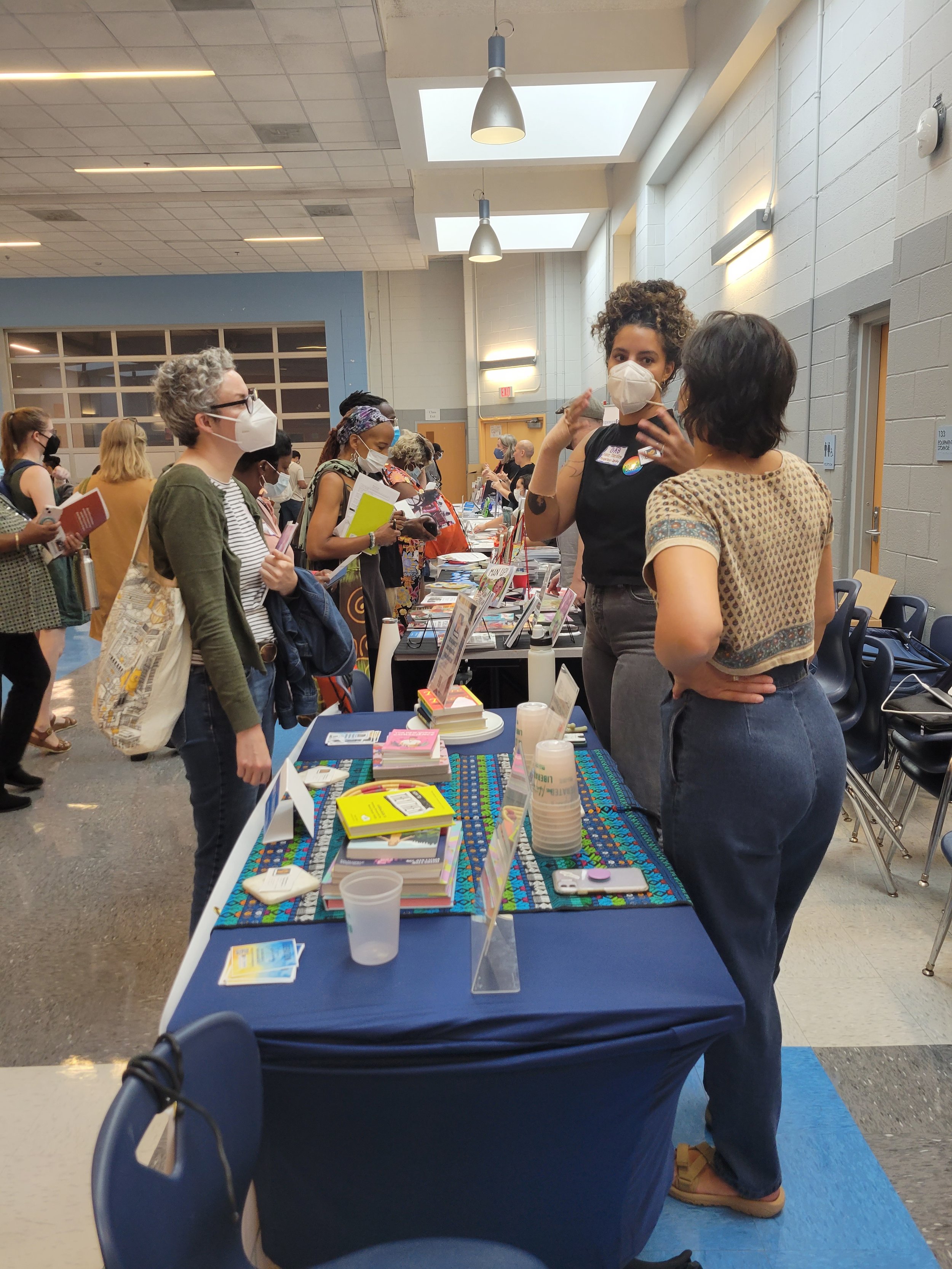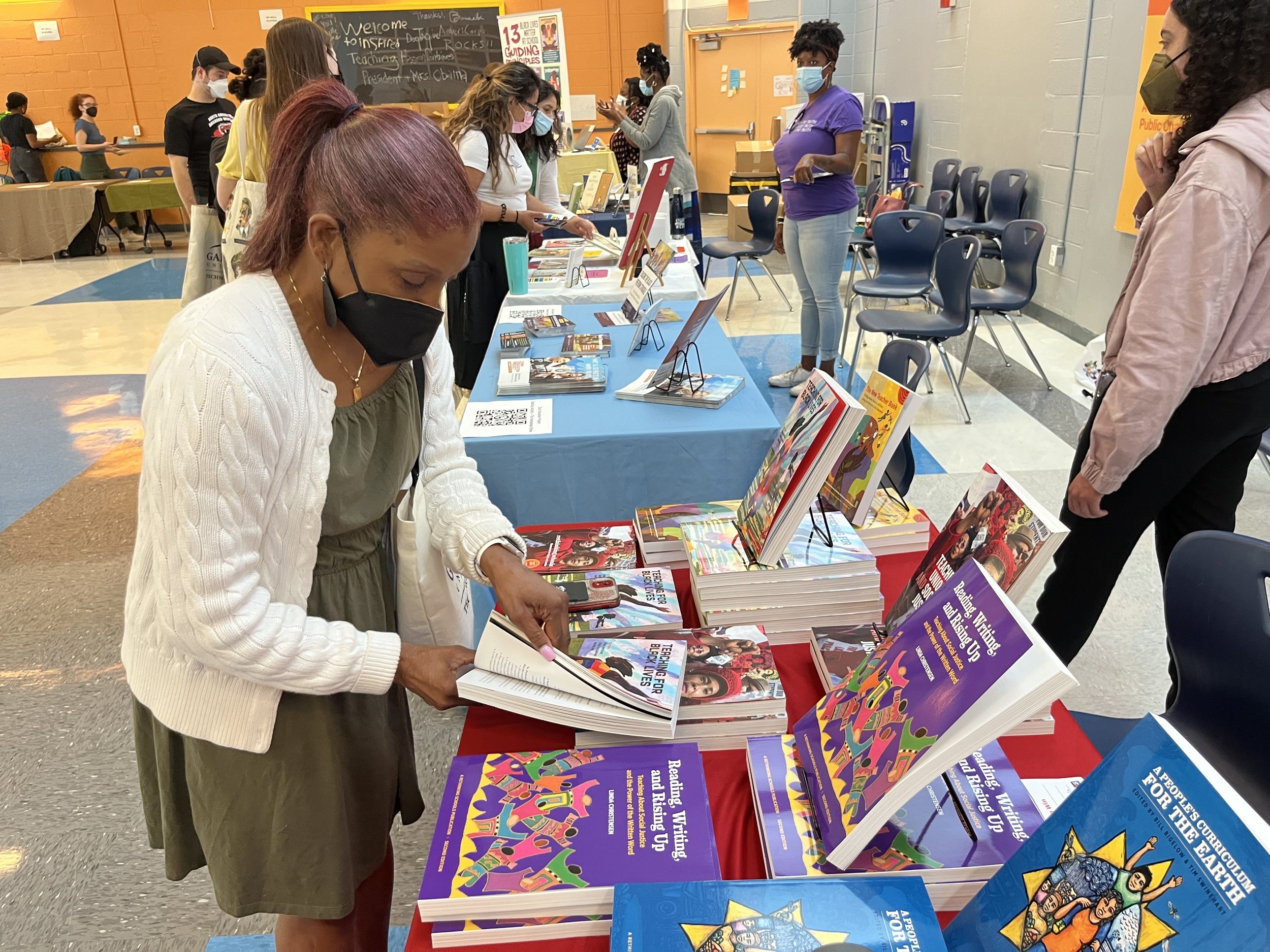Back to School with the Social Justice Curriculum Fair
Educators throughout the metro D.C. area participated in the event.
On Saturday, August 19, D.C. Area Educators for Social Justice (DCAESJ) hosted the second annual Social Justice Curriculum Fair at Inspired Teaching Demonstration School. Educators from all over the D.C. area — and even one educator from New Orleans, Louisiana — gathered to participate in powerful educator-led workshops, connect with local organizations supporting social justice education, and learn more about DCAESJ in preparation for the 2023–2024 school year.
Vanessa Williams, program manager for DCAESJ, and Kimberly Ellis, the Education Anew Fellow with Communities for Just Schools Fund, grounded attendees in how this year’s fair boldly championed Teaching for Change’s call to #TeachTruth. Vanessa stated,
The GOP is attacking public institutions via assaults on honest teaching and diminishing access to literature that provides windows, mirrors, and sliding glass doors to folks' identities and experiences. This fair is one way to continue resisting and to embrace the #FreedomToLearn and the need to #TeachTruth.
The resources provided by presenters and local organizations encourage teachers and students to question and re-think the world inside and outside their classrooms, build a more equitable, multicultural society, and become active global citizens.
Workshops
Banned Books and Radical Public Library Programming
Julie Seigel introduced the history of banned and challenged materials, legislation, advocacy, and resources. She reviewed how public libraries are combating attacks on intellectual freedom — specifically noting D.C. Public Library’s social justice-themed programming on LGBTQIA+ narratives and histories, public health, reproductive rights, and more. She broke down the steps to discussing banned books and participants left with tips on how to productively, yet respectfully, respond if faced with a challenge.
A participant shared:
I learned how to steward intellectual freedom as an inherent right. To identify the motivation behind the challenge of a book when confronted in a situation.
-
Julie Seigel is an adult services librarian at the Mt. Pleasant Library. She has been with the DC Public Library since 2019.
C.L.A.P. Back: Help Make Your School the Institution Your Students Deserve
Presenters and best friends Gab Sussman and Victoria Lebrón encouraged educators and administrators to recommit to abolitionist practice as the new school year begins. Through the acronym C(urriculum). L(anguage). A(dults). P(ractices). (B)ack, Sussman and Lebrón engaged participants in an “I do,” “We do,” “You do,” model grounded by a series of questions and scenarios for participants to consider. Questions included:
Is there explicit and diverse representation in the curriculum?
Is there vague or nonexistent language around inclusion in mission or diversity statements?
Do our policies explicitly protect marginalized groups?
Through segments breaking down each aspect of C.L.A.P., Sussman and Lebrón provided example responses and action steps to answer these questions, giving an entry point and agency to all levels of authority represented in this session.
Participants were later encouraged to review their own institution’s mission/diversity statement against the C.L.A.P. method. In pair shares and large group debrief, participants shared ways they would recommit this school year to abolitionist practices.
Sussman closed the session with encouragement, reminding participants: “The only way out is through.” As educators return to their classrooms, each action engaging in and holding others accountable to abolitionist practices are steps closer to the just communities we desire and our young people need.
A participant shared:
Presentation well designed. Loved the energy! Keep being amazing.
-
Gab Sussman (she/they) is an abolitionist educator and restorative justice practitioner. They were a classroom teacher for ten years, having taught early childhood, elementary, and middle school students. Gab holds a BA in Elementary Education from Loyola University Maryland and an MSEd in Administration and Supervision from Fordham University. She lives joyfully near Patterson Park in Baltimore with their spouse, rabbit, and dog. While not collaborating with Victoria and working at Bmore Transform, Gab is also the operations coordinator at Impact Hub Baltimore and the community outreach and events coordinator for Beer and Ballet. During their downtime, they are most likely binge-watching a show on Hulu, running errands at Costco, or volunteering at BARCS.
Victoria Lebrón (she/her) is an abolitionist educator, academic tutor, and SEL (Social-Emotional Learning) coach. She has 10 years of experience in the elementary classroom and has been tutoring elementary and middle school students for almost twenty years. Victoria holds a Master of Arts in Elementary Inclusive Education from Teachers College at Columbia University. Along with her spouse, two kids, and one mini-dachshund named Blueberry, she thrives in Mount Washington. She loves challenges, like learning new skills and working through a 1,000 piece puzzle or a difficult math problem. She takes pride in her Puerto Rican culture and heritage and is learning to speak Spanish with her children. While not tutoring or collaborating with Gab, she can be found cooking up something in the kitchen, listening to podcasts, or spending time with her family.
Disability Theory: Using the Curb Cut for Inclusive Lesson Design
DCAESJ secondary working group leader Mollie Safran challenged participants to better serve all students with universal design.
Safran began the session by explaining the difference between the medical and social models of disability — a key distinction to understanding universal design. Safran also explained the relationship between impairment and disability and provided examples so participants could better understand universal lesson design.
After discussion at their tables, Safran explained and provided examples of curb cut accommodations that support learning for all students. Participants brainstormed additional curb cut accommodations at their table groups, as well. Safran concluded by inviting participants to discuss assumptions they make as educators about learners when designing instruction and how they could deconstruct those assumptions to imagine classrooms that are more accessible for all.
Participants shared:
Great information shared. Wonderful presenter!
Mollie’s description and explanation of the Social Model of Disability clearly shows how teachers and administrators can endorse equity and inclusion in teacher development with lesson planning and design.
-
Mollie Safran (she/her) is a high school social studies teacher in Loudoun County. She recently completed her master's in Critical Pedagogies at George Mason and is also a team leader for the DCAESJ secondary working group.
Gender Identity in the Early Childhood Classroom
DCAESJ early childhood working group co-leaders Makai Kellogg and Sara Beshawred posed icebreaker questions:
When did you first figure something out about your gender and what was it?
When was a time you were told you had to or couldn’t do something because of your gender?
They then pivoted from folks’ personal reflections about gender and moved into analysis of professional practices in the classroom. They talked about goals in anti-bias education focused on gender identity and shared classroom practices they’ve found helpful in creating more gender-inclusive and affirming spaces for their students. Kellogg and Beshawred posted questions on chart paper for participants to reflect on and offer written responses to:
What messages/information promote positive gender identity for young children?
What questions have you heard young children ask about gender identity? How have you responded?
What are strategies for addressing gender bias and stereotypes with children?
They turned their attention to the ways gender stereotypes and the gender binary exist in children’s literature. Participants explored picture books that affirm gender.
A participant shared:
Great facilitation and conversation and fabulous content and resources!!!!
-
Makai Kellogg (she/her) is an anti-bias early childhood educator and equity and diversity coordinator at School for Friends in Washington, D.C. Makai creates age-appropriate curriculum on social justice for her students to explore equity issues, such as race, homelessness, gender stereotypes, etc. Makai leads the Parents of Multiracial Children group, Equity and Diversity Parent Book Club, as well as other programming throughout the year that allow parents to address their biases to be proactive as their children learn about the world around them. Makai facilitates training and opportunities for her colleagues to engage in identity work and discussions on equity and anti-bias education in the classroom. Through her work with young children and their families, she is creating an inclusive community of critical thinkers and change makers. Makai works closely with Teaching for Change and its initiative, the D.C. Area Educators for Social Justice, as an advisory board member. She is also part of the leadership team for the Anti-Bias Early Childhood Educator Working Group. Makai writes about her equity endeavors on her blog.
Sara Beshawred (she/her) is an early childhood educator who teaches and learns through a lens of liberation and belonging. She currently teaches Kindergarten at a PK-8 independent school with a focus on issues of social justice. Sara also serves on the leadership team of the Anti-Bias Early Childhood Working Group as part of the D.C. Area Educators for Social Justice, an initiative of Teaching for Change. When she is not teaching and learning, she can most often be found chasing her toddler and connecting with other caregivers around parenting practices rooted in respect, responsiveness, and joy.
G.R.A.C.E! A Framework for Equitable Math Game Design and Play
How do you get 100% of PK-5th grade students to eagerly engage in game design and math competition where everyone has an equal chance of winning regardless of assumed dis/ability? DCAESJ elementary working group member Tamyka Morant, PhD explored this question with participants in her workshop about MATEMANIDAD!
In this session, Morant shared a Black feminist pedagogical framework for planning a learning unit focused on math learner identity, collective value, design thinking, and mathematical reasoning. Participants practiced applying the framework to plan a lesson or unit that provides equitable, rehumanizing mathematics learning opportunities for ALL students.
Participants shared:
Students were empowered to work together and create their own math games.
Learning through math can be for all and fun!
-
Tamyka Morant, Ph.D. (she/her) has over 22 years of experience as a PK-8 educator serving as a teacher, researcher, instructional coach, instructional leadership coach, assistant principal, and adjunct professor in Washington, D.C., and Baltimore. She grounds her teaching and learning in Black feminism, Black feminist pedagogy, and justice praxis/ liberatory education. She is particularly interested in the identity and agency development of Black and Latinx/e students and the activism of educators, students, families, and community members organizing for educational equity and justice. She currently serves as the Assistant Principal of Bruce-Monroe at Park View, a public dual language elementary school in Washington, D.C.
Storytelling for Social Change: The Power of Leveraging Storytelling as a Vehicle for Youth Voice, Power, and Activism
Naomi Daugherty, a New Orleans-based program manager for Vocal Justice, provided participants with an overview of how to leverage storytelling as a vehicle for building youth voice, power, and activism in the classroom. Her goal was for educators to leave with an understanding of the role storytelling plays in the classroom, as well as strategies that encourage youth to utilize storytelling as a tool for social change. She also highlighted how incorporating storytelling activities prompted educators to develop a trauma-informed practice and teach with care.
Daughtry focused on how liberation and care are connected — as we all must be cared for to feel free. To care means to genuinely understand how trauma and injustice shapes all our lives and how elevating the leadership of those most proximate to injustice lifts us all. The language we use to invite rather than to tell is essential trauma-informed practice. It provided space for participants to assess the presented curricular ideas through direct engagement and evaluative discussion.
Participants shared:
Dynamic. Powerful. Relatable. Naomi embodies all three without question. She is living testimony to the power of storytelling, and her session was A.MAZING. Her premise is to empower youths through their own voice, elevating the art of storytelling to intentionally affect social change and better our society, our world.
Really loved the idea of storytelling to build community connections. And I really, really loved the spoken word poem format shared with us!
-
Naomi Scherelle Daugherty is a living witness. She is a spirited healer, writer, educator, and alchemist cultivating soft places for Black folks to land. In 2021, Naomi released her first collection of poetry, an 18-poem chapbook titled The Clearing: A Black Girl Collecting Her Bones. Naomi spent her early years in education teaching high school students how to read, write, hustle, and heal themselves. Currently, Naomi architects curriculum rooted in self-exploration and compassion, while centering the ancient art of storytelling. As the program manager for Vocal Justice, Naomi develops soft and revolutionary spaces for educators to commune, explore, and deepen their practice. In her work, Naomi leverages intergenerational wisdom and studies abolitionist education practices to cultivate programing for both educators and young people. Naomi is also the creator of 4ColouredGurlz, a wellness business that is an ode to Black folks and a declaration that comfort and joy is a colored girl's birthright.
Teaching Students With Privilege About Privilege: Successes and Setbacks
Vinny Prell and Arielle Derby are a teacher and administrator/teacher who have worked in mostly white and wealthy/upper middle class schools. They reviewed answers to the questions they wrestled with in their own classrooms and school buildings:
How can social justice educators respond when faced with a community where most students are privileged?
How can we, and our students and school communities, move from — in the words of Dr. Bettina Love — being allies to co-conspirators?
How do we navigate the politics and realities of independent schools and other wealthier school communities as we do this work?
Presenters reviewed how to work with families that have privilege and introduced new conversation points and frames that support building unity among students. The four themes introduced were:
Building understanding with students about institutional inequities
Developing students as allies
Working with families with privilege
Engaging with colleagues/administration
Through a group discussion, participants interrogated the use of the word “building” and offered the following rephrase of the first theme: ”Foster/cultivate understandings with students about institutional inequities.”
Each theme focused on teaching students about institutional oppression, while still supporting their development as change makers. Participants gathered in thematic groups to share experiences, teaching strategies, and challenges they have faced.
For example, the conversations out of the theme “developing students as allies,” raised two discussion points:
How to engage students with privilege as allies
How to engage all students as allies in antiracist practice
Resources and lesson ideas were shared to strengthen ideas generated in these small groups.
A participant shared:
Many schools are facing similar challenges when it comes to making families with privilege aware of it and the need to be explicit when making the school’s values clear.
-
Vinny Prell (she/he) grew up in an interfaith interracial family in Los Angeles. More a fan of politics than movies, she moved to DC in 2006. He has dedicated nearly 20 years to anti-oppression work, including serving as the executive director of NUJLS, the National Union of Jewish LGBTQI Students. Currently she spends time discussing racism, xenophobia, poverty, and Jewish values with ten year olds at Milton Gottesman Jewish Day School. She has BAs in Literature and the Study of Race and Racism, as well as an MA in Minority and Urban Education. Vinny enjoys crocheting, geocaching, playing ukulele, cooking (shows), growing vegetables, and playing with his rescue kitties.
Arielle Derby (she/her) grew up in Manhattan and believes the urban landscape provides the most beautiful views. She has a BA in American Studies and an MA in education and has been an elementary educator since 2001. Raised by a village of overly idealistic Jewish hippies, she was given a mandate to make the world a better place and has been endeavoring to fulfill it through discussing Important Things with children and their teachers and providing tools for students to be agents of change in their own lives and the wider world. This summer she ended a seven-year stint as the elementary principal at the Milton Gottesman Jewish Day School and is delighted to be returning to the classroom as a middle school English teacher at the Inspired Teaching Demonstration School. Arielle enjoys public transportation, books, fabric arts, hosting dinner parties, and spoiling her cats. She also has two delightful and infuriating children.
Using Literature Circles to Decolonize the Canon
Are there any benefits to exposing students of color to the high school canon? Zack Wilson, Prentiss-Charney Fellow and DCAESJ secondary working group member, reflected on this question with participants.
Zach explored how diverse retellings of canonical texts can be leveraged in the classroom as a way to give students an entry point into discourses about language, power, and the impact of colonialism on their education. He asked, “How does changing an iconic character's race, gender, or nationality open up new conversations about justice, revolution, and truth?” Participants also explored how placing graphic novels, YA fiction, and contemporary fiction in dialogue with classic literature can empower adolescent readers to "talk back" to famous writers. This session equipped ELA teachers with strategies not only to diversify their reading lists, but also to scaffold challenging vocabulary, differentiate through offering a choice of leveled texts, and to use film, media, and art to engage in discussion and critique.
A participant shared:
I deepened my thinking about lit circles. Having a weekly schedule is a big take away for me, as well as thinking about how to create many ways for students to access complex texts.
-
Zack Wilson (he/him) teaches sophomore English at Columbia Heights Education Campus (DCPS). As an educator, he is deeply interested in the intersection of literacy, race, and social justice. More specifically, he invites educators to reject the harmful myth of Black illiteracy stemming from Eurocentric standardized tests and deficit frameworks which insist that Black students lack language, knowledge, or culture. Instead, he advocates for utilizing and legitimizing multiple, diverse literacies and modalities of text in ELA classrooms so that students can "read the world."
Mini-Workshops
Intro to DCAESJ Working Groups: Past Work and Future Goals
Participants were introduced to the D.C. Area Educators for Social Justice (DCAESJ) project and celebrated the DCAESJ achievements in previous school years. Participants learned about and received information about how to apply to the DCAESJ working groups and discussed their own social justice goals in their practice. They also helped brainstorm and plan for the working group in the 23-24 school year. Read more about and apply to our early childhood - secondary DCAESJ working groups.
-
Raphael Bonhomme (he/him) is an ambitious educator of Haitian descent. After graduating from Howard University’s education program with his MEd, Raphael began his career in education in D.C. He is currently in his ninth year teaching in DCPS, having taught in Title 1 and non-Title 1 schools. He currently teaches third-grade math, science, and social studies and enjoys teaching holistically, incorporating social justice, art, and restorative practices into the classroom. He is also a teacher facilitator with DCAESJ’s Elementary Working Group. He always aims to show the link between classroom concepts and the real world. His goal is to plant seeds of curiosity to empower students to take action in becoming open-minded, empathetic, global social change agents. In his free time, he can be seen biking through D.C., painting, playing handball, listening to live jazz, or cooking some Haitian cuisine.
Mollie Safran (she/her) is a high school social studies teacher in Loudoun County. She recently completed her master's in Critical Pedagogies at George Mason and is also a team leader for the DCAESJ secondary working group.
Writing for Publication with Rethinking Schools
Writing can be a tool for political activism, community-building, and social change, especially at a time when legislators are banning teaching the truth across the country. Attendees were guided through a creative writing process that aided them in telling stories about their teaching and organizing. The facilitator, Rethinking Schools’ executive director Dr. Cierra Kaler-Jones, shared tips and strategies for writing for publication.
-
Dr. Cierra Kaler-Jones is the first ever executive director of Rethinking Schools and is also on the leadership team of the Zinn Education Project, which is coordinated by Rethinking Schools and Teaching for Change. Cierra is a teacher, a dancer, a writer, and a researcher. Most recently, she has been director of storytelling at the Communities for Just Schools Fund, a national collaborative that links philanthropy with grassroots organizing.
Giveaways & Certificates
In addition to a robust selection of workshops and exhibits, participants received:
A choice of a children's or young adult book thanks to donations by Albert Whitman & Co., Astra Publishing House, Groundwood Books, Haymarket Books, Lee & Low Books, Lerner Publishing Group, Shout Mouse Press, and Simon & Schuster.
A 3.5 hour professional development certificate
A chance to receive prizes from Yoga Heights, The Board and Brew, Right Proper Brewing Company, Circle Yoga, District Clay Center, Slipstream, Vigilante Coffee, Lost Generation Brewing Company, Bullfrog Bagels, Call Your Mother, Baked by Yael, REWILD, District Made Spirits, 532 Yoga, GALA Theater!
Tabling
Before and after the first round of workshops, nearly 20 D.C. area organizations were represented at exhibition tables, showcasing the myriad ways social justice educators can get involved and seek resources and support in curriculum development and organizing.
Thank you to @dcaesj for inviting us to table & lead a workshop on writing for publication at your Social Justice Curriculum Fair!
— Rethinking Schools (@RethinkSchools) August 19, 2023
We loved meeting & chatting with all the DC Area educators! pic.twitter.com/73ZY5S35tl
A great morning talking with so many fantastic educators at the @dcaesj Social Justice Curriculum Fair! We’re starting to get excited for the upcoming school year! pic.twitter.com/BwfvqRed8E
— AnOpenBookFoundation (@AOBFound) August 19, 2023
Tabling Organizations
An Open Book Foundation connects Washington D.C.-area students to authors, illustrators, and their books to nurture a lifelong love of reading. We support educational justice by building equitable access to interactive literacy enrichment and high-quality books.
The Black Knowledge Coalition is dedicated to the goal of collective Black liberation, and removes barriers to information for the Black community. Leaning on the principles of mutual aid and with a commitment to community education, BKC shares valuable information that is kept behind a paywall with the people. By using more accessible language and encouraging dialogue and organizing, BKC uses a coalition of minds to expand the information network within our community.
The Baltimore Transformative Learning Collective, or BMore Transform, was founded in April 2022 by two passionate abolitionist educators who collectively hold nearly 30 years of experience. They want everyone to love learning and, as such, offer a dedicated space for students (especially those who identify as queer, BIPOC, or neurodivergent), educators, and other community members to continue pursuing their interests.
Center for Inspired Teaching is an independent, nonprofit organization that invests in and supports teachers. Inspired Teaching provides transformative, improvisation-based professional learning for teachers that is 100% engaging – intellectually, emotionally, and physically.
D.C. Area Educators for Social Justice is a network of educators who seek to strengthen and deepen social justice teaching. We are a community of mutual support for educators to collaborate on curriculum, professional learning, and activism. We challenge systems of oppression through anti-bias, anti-racist, and multicultural education. We work with students, families, and other educators in and outside of our classrooms to create a more just and equitable world.
Founded in 1894, the DC History Center deepens understanding of our city's past to connect, empower, and inspire. As the only community-based nonprofit focused on the District’s history, our vision is to reach into all eight wards to preserve and elevate the stories of Washington's diverse people, neighborhoods, and institutions.
The People’s Archive is DC Public Library’s local history center with materials on D.C. and African American history and culture.
EmpowerEd’s mission is to bring about a more just and equitable education system for all D.C. students by centering the voices and ideas of diverse educators and creating a culture of shared leadership that retains excellent educators.
GALA (Grupo de Artistas Latino Americanos) Hispanic Theatre is a National Center for Latino Performing Arts in the nation's capital. Since 1976, GALA has been promoting and sharing the Latino arts and cultures with a diverse audience, creating work that speaks to communities today and preserving the rich Hispanic heritage for the generations that follow. By developing and producing works that explore the breadth of Latino performing arts, GALA provides opportunities for the Latino artist, educates youth, and engages the entire community in an exchange of ideas and perspectives.
Life After the Impact is a 501(c)(3) organization founded by an impacted mother of police brutality. The organization provides a platform for these families to share their stories and increase community awareness while providing information and resources to assist affected communities in navigating the legal system seeking justice and accountability.
Prologue DC of Washington-based historians knows how to find and tell the stories you’re looking for. Whether it’s a neighborhood, school, church, business, or organization, Prologue DC can help you mark an anniversary or other milestone, raise visibility, and demonstrate your unique place in Washington history.
Rethinking Schools is a nonprofit publisher and advocacy organization dedicated to sustaining and strengthening public education through social justice teaching and education activism. Our magazine, books, and other resources promote equity and racial justice in the classroom. We encourage grassroots efforts in our schools and communities to enhance the learning and well-being of our children and to build a broad democratic movement for social and environmental justice.
Shout Mouse Press is dedicated to centering and amplifying the voices of marginalized youth (ages 12+) via writing workshops, book publication, and public speaking opportunities.
Social Justice Books, a project of Teaching for Change, provides curated lists and critical reviews of multicultural and social justice pre-K-12 books.
Teaching for Change provides teachers and parents with the tools to create schools where students learn to read, write, and change the world. Our programs include the DCAESJ, Teaching Central America, Zinn Education Project (with Rethinking Schools), Civil Rights Teaching, Teach the Beat: Go-Go.
Vocal Justice positions youth who are proximate to injustice as leaders for social change. Proximate youth know how we need to change the status quo, but they often aren’t supported to speak up. We’re changing that.
We are Words, Beats & Life (WBL), D.C.’s longest running, dopest hip-hop based arts educational nonprofit. They achieve this goal through workshops, after school programs, concerts, and festivals.
The Zinn Education Project (coordinated by Teaching for Change and Rethinking Schools) promotes and supports the teaching of people’s history in classrooms across the country. Since 2008, the Zinn Education Project has introduced students to a more accurate, complex, and engaging understanding of history than is found in traditional textbooks and curricula.
Thank You!
D.C. Area Educators for Social Justice thanks Inspired Teaching Demonstration School for serving as a venue for this year’s event, the organization’s that partnered to promote and table at the event, publishers for donating books to giveaway, local businesses for their in-kind donations, volunteers who gave their time, and, of course, the educators present for attending and for the powerful work they do every day.
The Social Justice Curriculum Fair was made possible by the generous support of our D.C. Area Educators for Social Justice donors, including the The Morris and Gwendolyn Cafritz Foundation, Communities for Just Schools Fund, the Taste of Salt Fund, an anonymous grant, as well as donations from individuals. Giant, Trader Joe’s, Costco, and Starbucks donated refreshments. Newell donated reusable water bottles and Sharpie pens for each participant.
Donate now to support DCAESJ activities all year!


